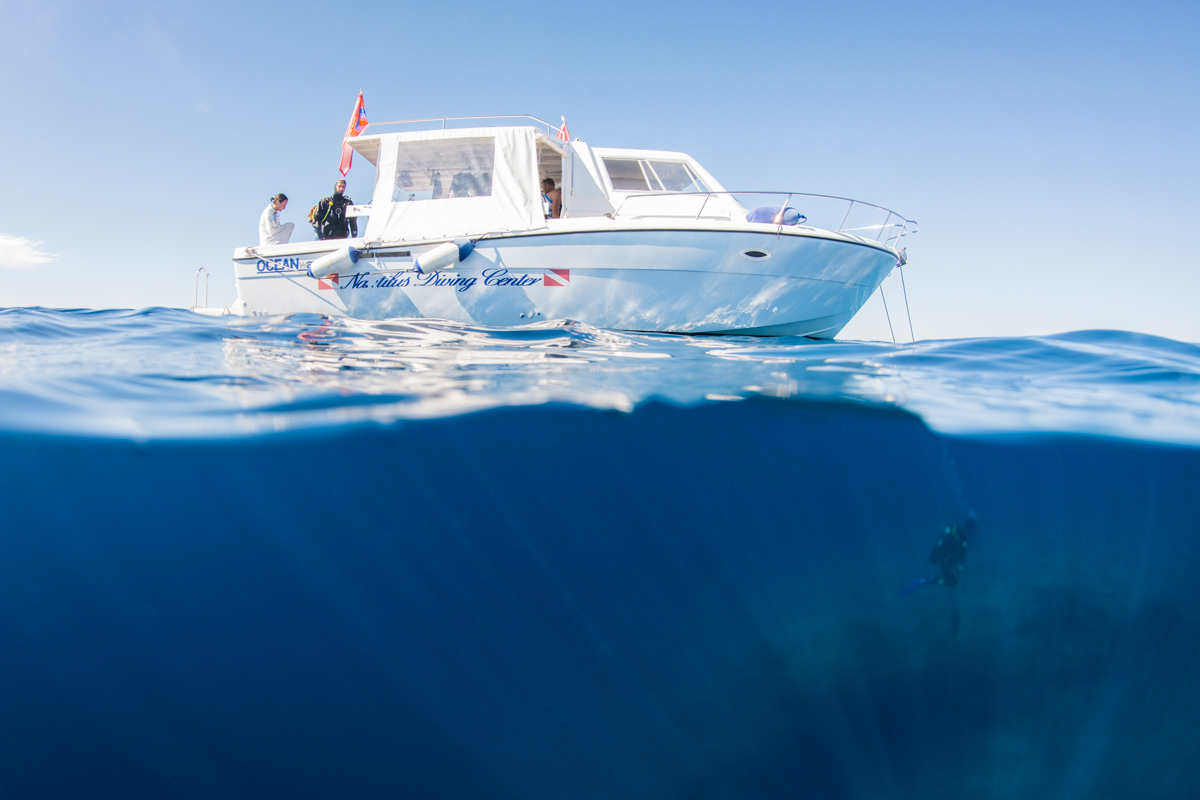- More More
- Blog
- Inspire me
- Groups
- Offers More
- Dive Courses More
- Liveaboards
More

Liveaboard Trips
On-board accommodation offering the opportunity to live right over the dive sites and to experience secluded dives...
Diving regions...
- LATEST AVAILABILITY BY REGION
- Red Sea availability
- Maldives availability
- Indonesian availability
- Socorro Mexico availability
- Galapagos availability
- ALL LIVEABOARD DIVING REGIONS
- Bahamas
- Bikini Atoll
- Caribbean
- Cocos Island
- Destinations
MoreDIVING REGIONS...
Our Top destinations....Why not try....
Find a trip
- Resort
- Liveaboard
Best Ways to Dive the Bahamas
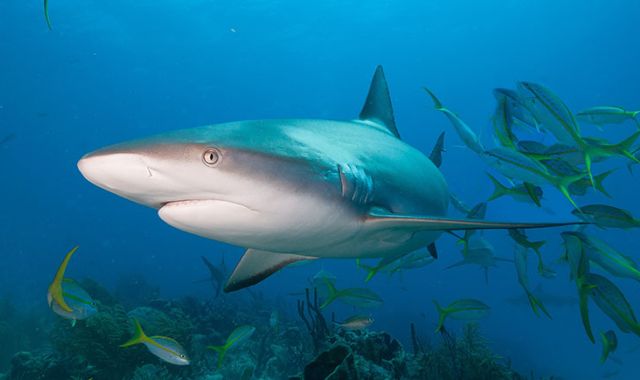
20 Feb 2025
A vast choice of caverns, blue holes, lush coral gardens, infinite walls and wrecks, both historical and artificial, mean that the Bahamas is one of the most complete dive destinations on the planet. There is something here for all divers, coupled with diverse marine life including all manner of sharks, dolphins, turtles, masses of schooling reef fish, and Bahamian national fish, the Nassau Grouper.
The Bahamas has earned a global reputation as a premier shark diving destination, particularly around Bimini. Unlike fleeting glimpses of sharks in other locations, encounters here are often intimate and prolonged. Divers can expect close-up experiences with Caribbean reef sharks, lemon sharks, nurse sharks, bull sharks, great hammerheads, tiger sharks, and even elusive oceanic white-tips, often seen near wrecks or in the company of wild dolphins.
Resort Diving in the Bahamas
With great all year round diving conditions, the Bahamas is ideal for those looking to combine excellent diving and snorkelling with relaxing on beautiful beaches and a variety of attractions topside. International tourist hub Nassau, capital of the Bahamas, is a natural starting point for a Bahamas holiday and offers an amazing variety of diving within an hour’s boat ride from the island.
Nassau’s vibrant culture is more than matched below water with spectacular coral walls close to shore and pretty reefs teeming with life, large and small. The eponymous Shark Wall, which drops from 10m to an incredible 2km or more, is a highlight, as are an enormous selection of wrecks. Here you can dive everything from historical cutters to artificially-sunk freighters, a make-believe Vulcan bomber and a twin Cessna used as underwater film sets in James Bond, Jaws and many other movies.
Liveaboard diving in the Bahamas
The variety of diving and atmosphere of the different islands makes the Bahamas an ideal liveaboard destination or equally good for those wanting to discover more of the country on a twin centre holiday. Regaldive offer seven to ten night trips on-board the comfortable liveaboard Bahamas Aggressor which sails out of Nassau and explores the beautiful Exuma Cays Land and Sea Park, and Freeport for Tiger Beach.
The Exumas are a 120-mile long island chain of 350 scenic small islands and cays which offer blue holes, swim throughs and incredible wall dives in the deep channels that separate the land mass. With up to five dives a day, divers will have plenty of opportunity to explore the crystal-clear aquamarine waters, thick with coral reefs alive with every imaginable ocean critter.
We also offer special summer trips aboard various liveaboards that embark in Freeport and visit the remote areas around the West End of Grand Bahama Island and the famous Tiger Beach, considered to be one of the world’s greatest shark dive spots. The exciting Tiger Beach itinerary offers the chance to encounter tiger and lemon sharks in large numbers, as well as nurse sharks, reef sharks, dolphins and numerous smaller species for a truly unforgettable dive holiday.
To find out more, call our expert team on 01353 659999 for a chat and a tailormade holiday quotation, or contact our team today!
Find a trip
- Resort
- Liveaboard
GO Diving Show!
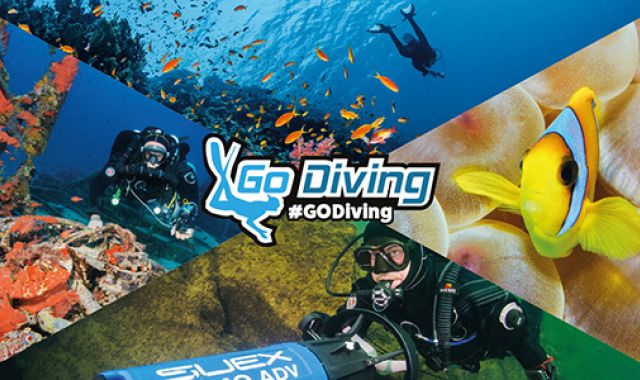
20 Feb 2025
Our Regaldive experts have an extensive range of diving knowledge and travel experience between them that spans the globe, so come by and let us inspire your next dive trip.
This exciting diving show is innovative and interactive, with a range of high-profile speakers, multiple stages devoted to different diving disciplines and various diving challenges and experiences. Whether you’re a seasoned diver or just starting out, this show should have something for everyone.
We also have a brilliant selection of deals, offers and savings available exclusively for the GO Diving show… so come by our stand and save!
What’s more, we're also hosting an incredible free prize draw on our stand! Enter to win dive equipment supplied by Mike’s Dive Store and Scubapro worth over £3,000! To be in with a chance of winning this brilliant prize, come along to stand 820 at the GO Diving show this weekend.
For more information and our full selection of incredible deals, savings and offers, come along to stand 820 at the GO Diving Show next weekend!!
Find a trip
- Resort
- Liveaboard
Dive with Bull Sharks in Mexico
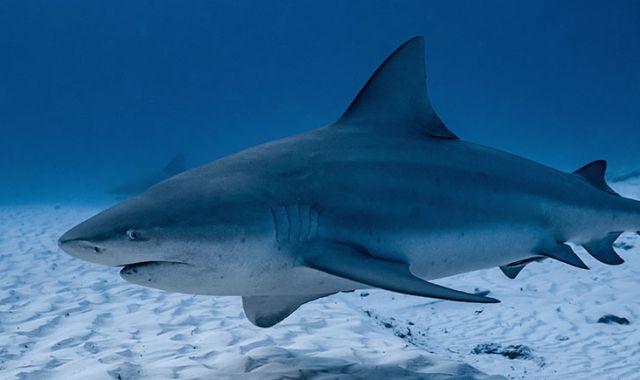
20 Feb 2025
The name bull shark comes from the short, blunt snout and their strange inclination to charge (head-butt) their pray before attaching. At over three metres in length and thick bodies, bull sharks sightings in Playa del Carmen are a true diving highlight of the area. These, mostly female and usually solitary, apex predators come together to what is understood to be a breeding ground for the sharks.
At this time of year, the weather is usually at its calmest and the cloud level is minimal, both of which make it an ideal time to dive the Cenotes and Cozumel. Playa del Carmen is an excellent base for exploring the Yucatán Peninsula and is a more affordable and accessible area compared to other bull shark experiences global.
Diving with bull sharks is only possible on special trips, which are organised by highly trained instructors to ensure the utmost safety and environmental responsibility. Divers on these trips also take part in a special education programme and need to have a minimum certification of advanced plus 25 logged dives. Two local check dives must be undertaken prior to the bull shark diving trip.
If you’re interested in joining a bull shark adventure, please contact us for more details of our Mexico dive holidays.
Thanks to our partners in Mexico for this amazing video!
Find a trip
- Resort
- Liveaboard
Top Picks for Your Family Diving Holiday

17 Feb 2025
With more and more families looking to dive and travel together this open up many destinations for your next vacation, scuba diving holidays have never been more accessible. We understand that each family’s requirements are different and whether you’re all divers, or you’re the only one with gills, or it will be your children's first time, and they're begging to learn, this helpful guide we’ll talk through our top destinations for family diving holidays, so you can spend time with your family and exploring the underwater world!
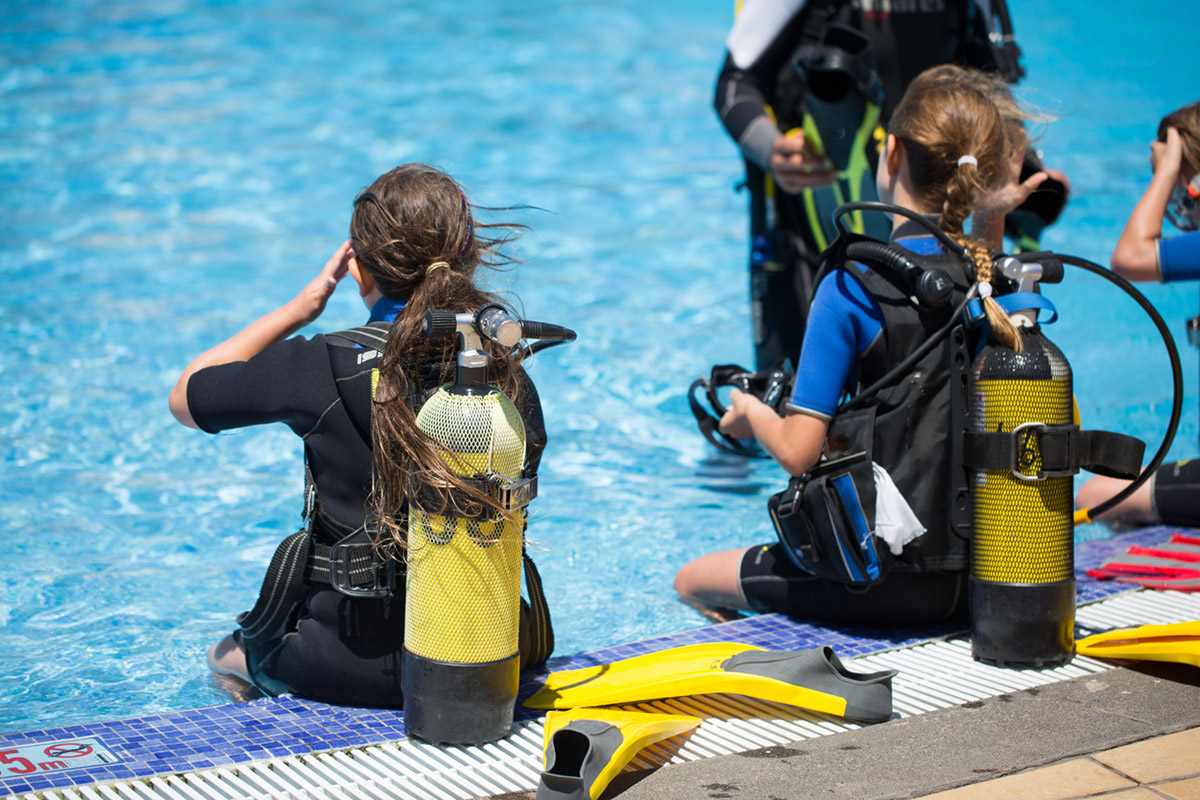
Malta
Short haul is often preferred, especially when travelling with younger children. Many are looking for a family friendly holiday that's good value for money, has a swimming pool and ideally a Kids' Club. Hotels with either family rooms or adjoining rooms and plenty of meal choices are key.
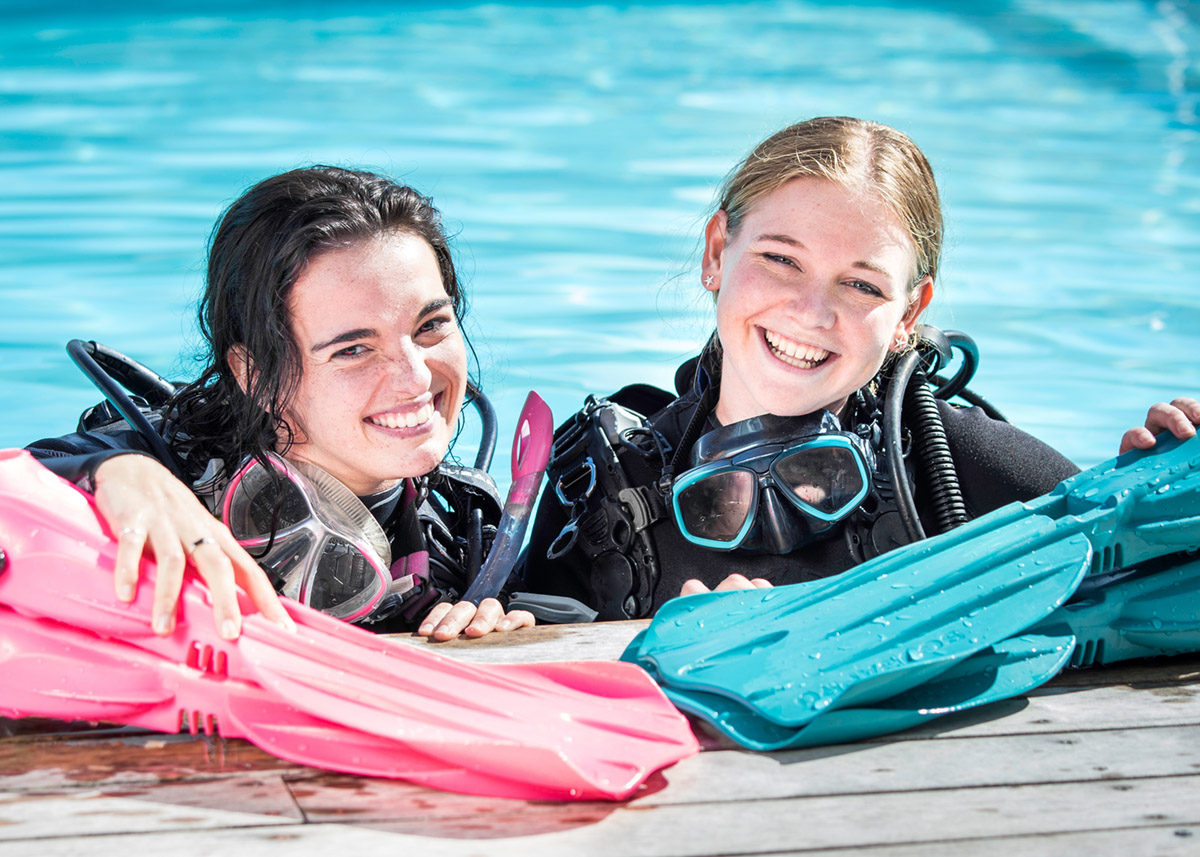
Doubletree by Hilton in Malta ticks these boxes for many families. It's also near Maltaqua Dive Centre who pick up from the hotel each day, if there are a handful of divers in your family then this allows you to be in a prime location night and day while having family friendly facilities.
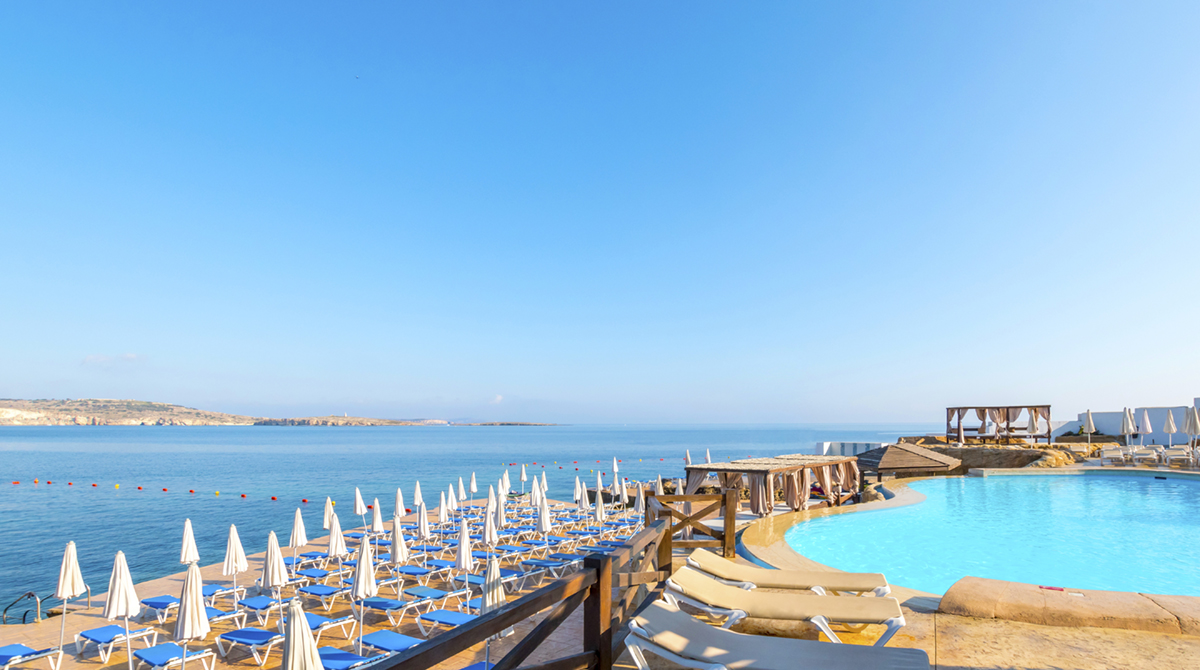
Flights to Malta are daily from Heathrow and Gatwick and options from regional airports too, with a flight time of just three hours and short transfers on arrival, it's much easier to keep the children entertained! Perfect for a summer holiday.
Red Sea
Another family favourite if you can't wait until summer is the Red Sea, five hours flight from the UK this mid-haul destination is a popular choice for getting your first taste of the underwater world. Providing guaranteed sunshine almost all year round in Egypt, both the Sheraton Resort Soma Bay and the Jaz Fayrouz Sharm El Sheikh Resort tick all the boxes for a great family holiday. Both are facilitated by excellent dive centres who have experience teaching kids, ensuring each student is given the time to practice and to learn to scuba dive safely while in a fun environment.
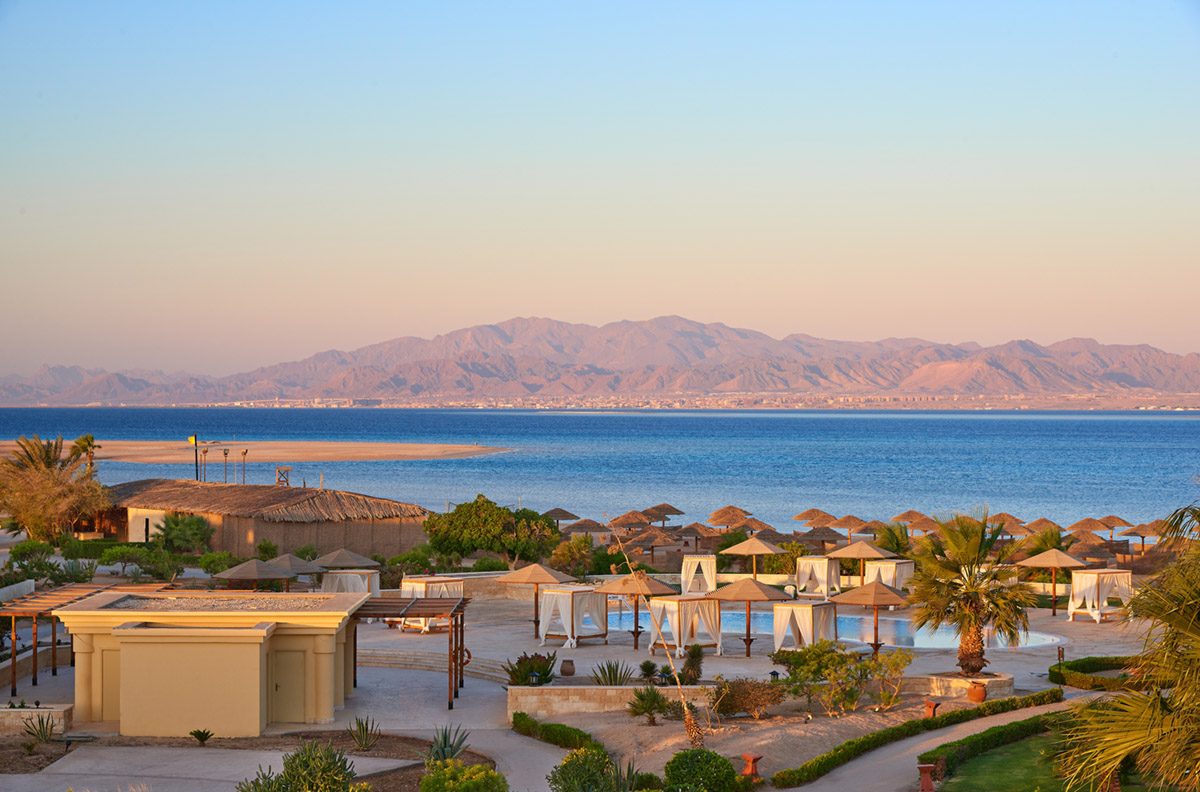
Image by Mohamed Abdei Hady
Sheraton Resort Soma Bay is an excellent destination for some winter sun (February half-term or the Easter Holidays) with first class facilities at the dive centre just a few steps away. The stunning beach extends out to a spit, providing a shelter area ideal for the kids to take their first breaths underwater. This luxury resort also caters for the non-divers in your family, with an onsite spa and kids club, in addition to a kite surfing facility nearby. In the great scuba diving destination Sharm, there are daily pick up for the scuba divers staying at Jaz Fayrouz, and the rest of the family can play at the kids' clubs, in the many swimming pools all while staying in rooms that accommodate the whole family. Combine that with short transfer times and weekend flights, so no need for days off school, and all of our ideals on the family wish list have been ticked!
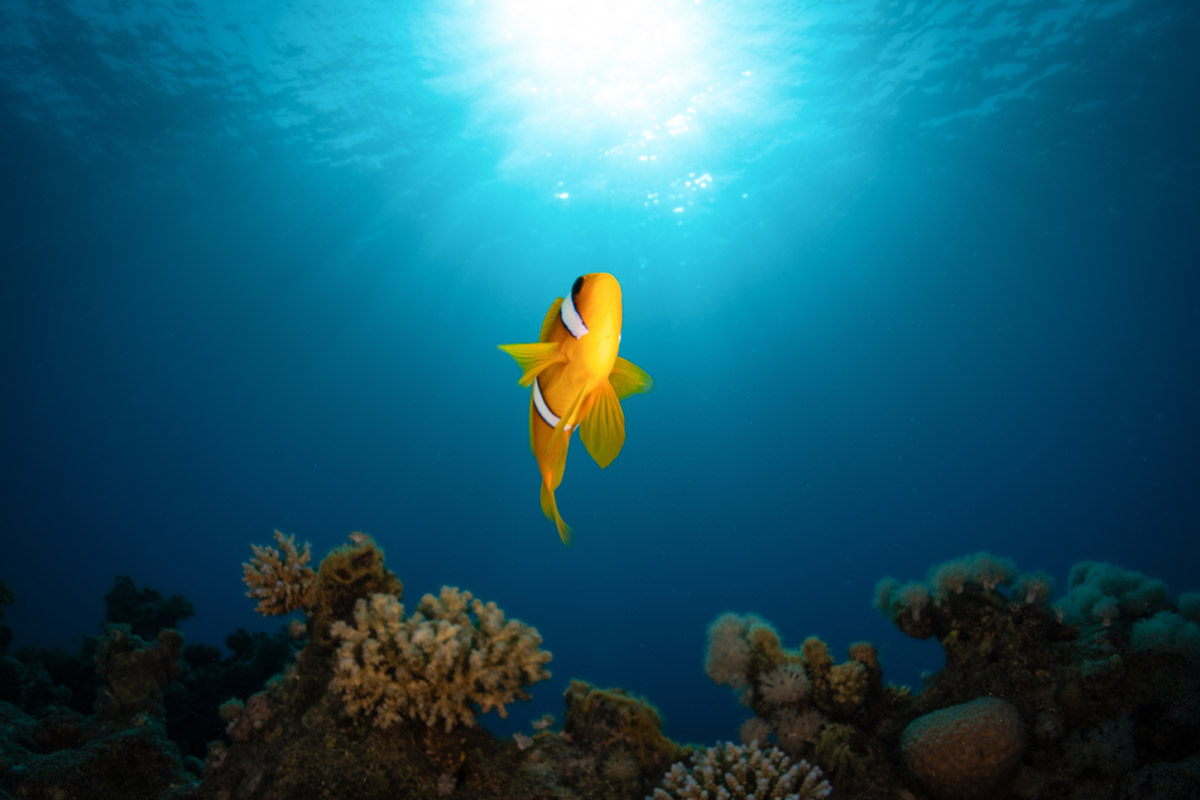
The Red Sea also have a number of liveaboards (a dive boat you stay on for the duration of your holiday) that are able to cater to scuba diving families. Once qualified, grab the kids and set sail for the open sea, discovering some of the best dive sites the Red Sea has to offer. Generally, liveaboards have an age limit of 15 (due to the depth limit restrictions of Junior Open Water). It's possible to conduct courses while on board, including progressing to Advanced Open Water or learning to dive with Nitrox. Contact us to find out more about a Red Sea liveaboard holiday for your family.
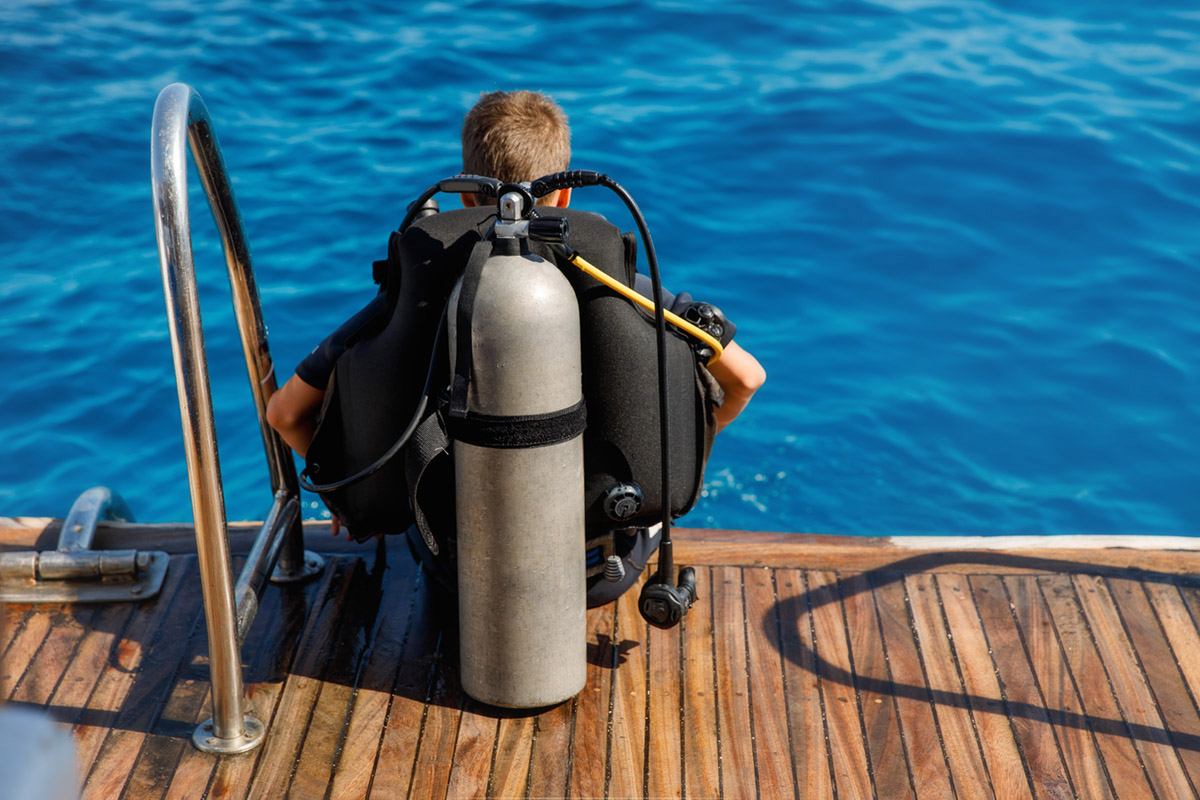
Thailand
A families holiday with added exploration, Thailand offers great diving and affordable accommodation in a beautiful area of the world! The warm seasonal waters make for an excellent winter get away with guaranteed sun and fun over the Christmas holidays, February half-term or even Easter.
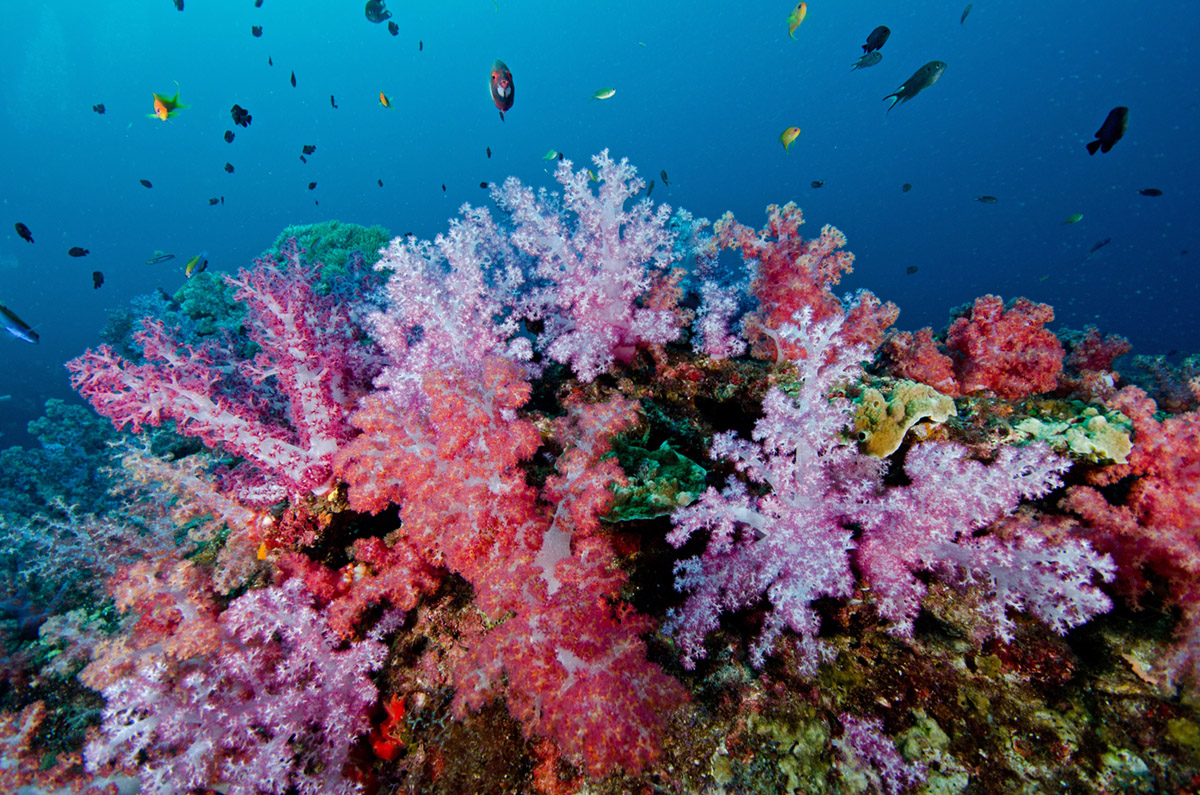
Although classed as long haul, the total travel time from the UK to Phuket is from 17 hours, tolerable for older children. Transfer time to hotels are between 30 minutes and two hours, it's definitely in reach for adventurous families. Accommodation ranges from simple, ideal for full scuba diving families where the focus is the water, to luxury for those looking for a mixture of activities over their holiday. In Khao Lak the X10 Resort has a dedicated family wing, kid’s club, multiple swimming pools, direct beach access and a baby sitting service, keeping everyone happy throughout your visit. The scuba diving is suitable for all skill levels, and with a variety of marine life including turtles, mantas, and colourful corals even the experienced diver in the family will have an amazing time.
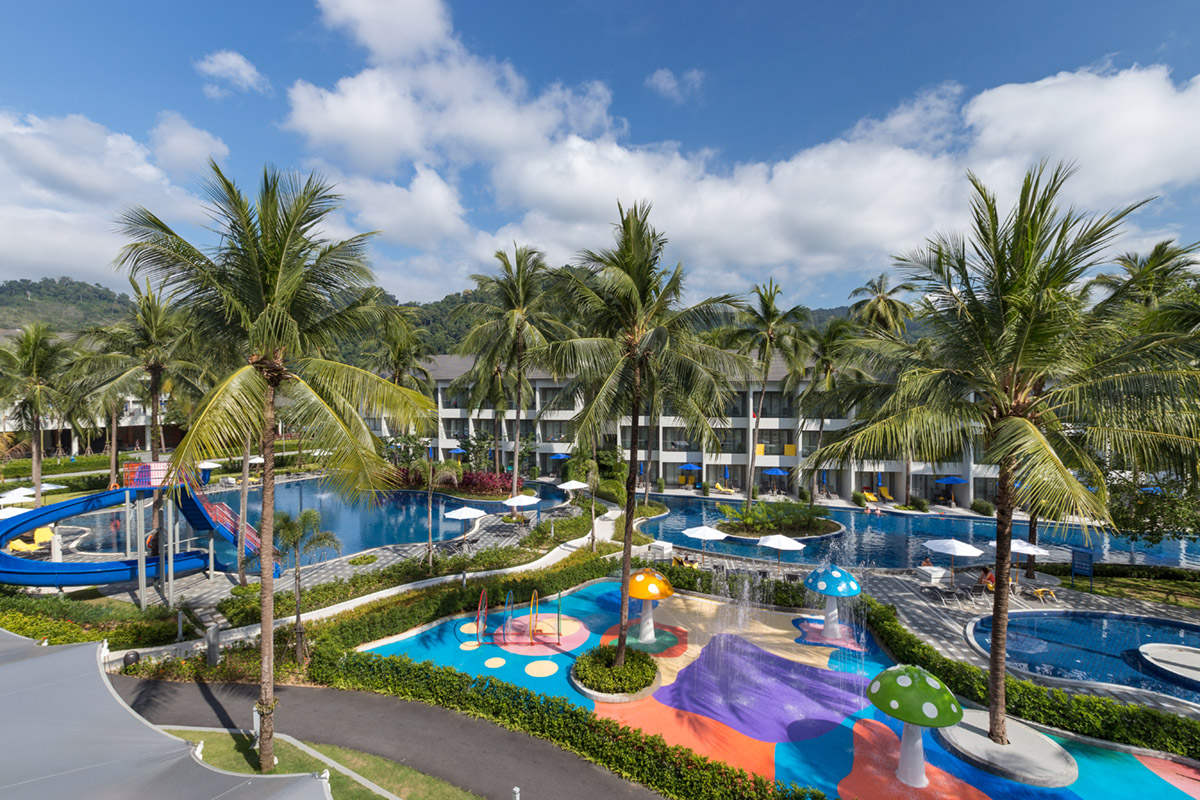
Maldives
The Maldives is a well-known destination in the Indian Ocean for experienced divers, but it's actually a wonderful place for beginners and all the family to explore.
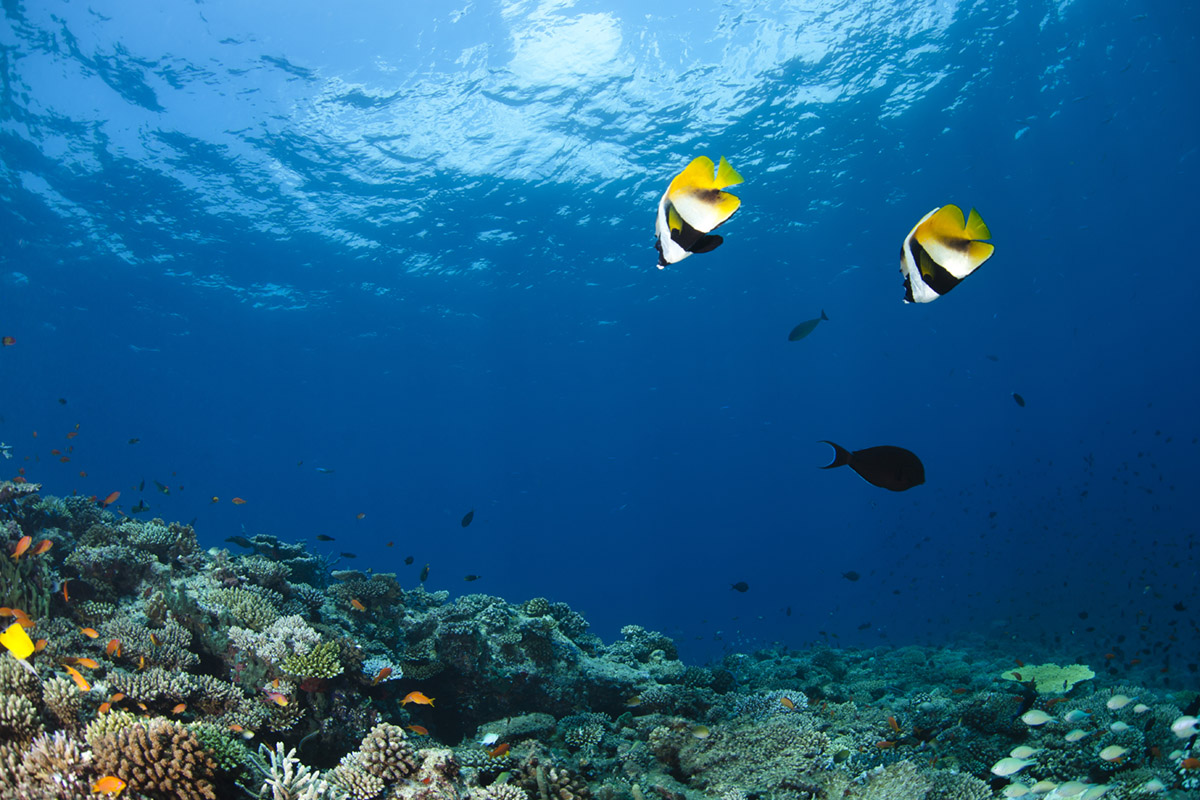
Maldivian Resorts are fully geared up to keep your family entertained, both in and out of the water. Many hotels offer a kid’s club, baby sitting service, tennis courts, spas, alongside both motorised and non-motorised water activities. Larger resorts such as Vilamendhoo have multiple dining options and activities planned throughout the day. The island resorts have shallow, sheltered lagoons where the family can learn to scuba dive in a stress-free environment. These protected waters also provide a safe area to play and snorkel with the marine life on the vibrant house reef.
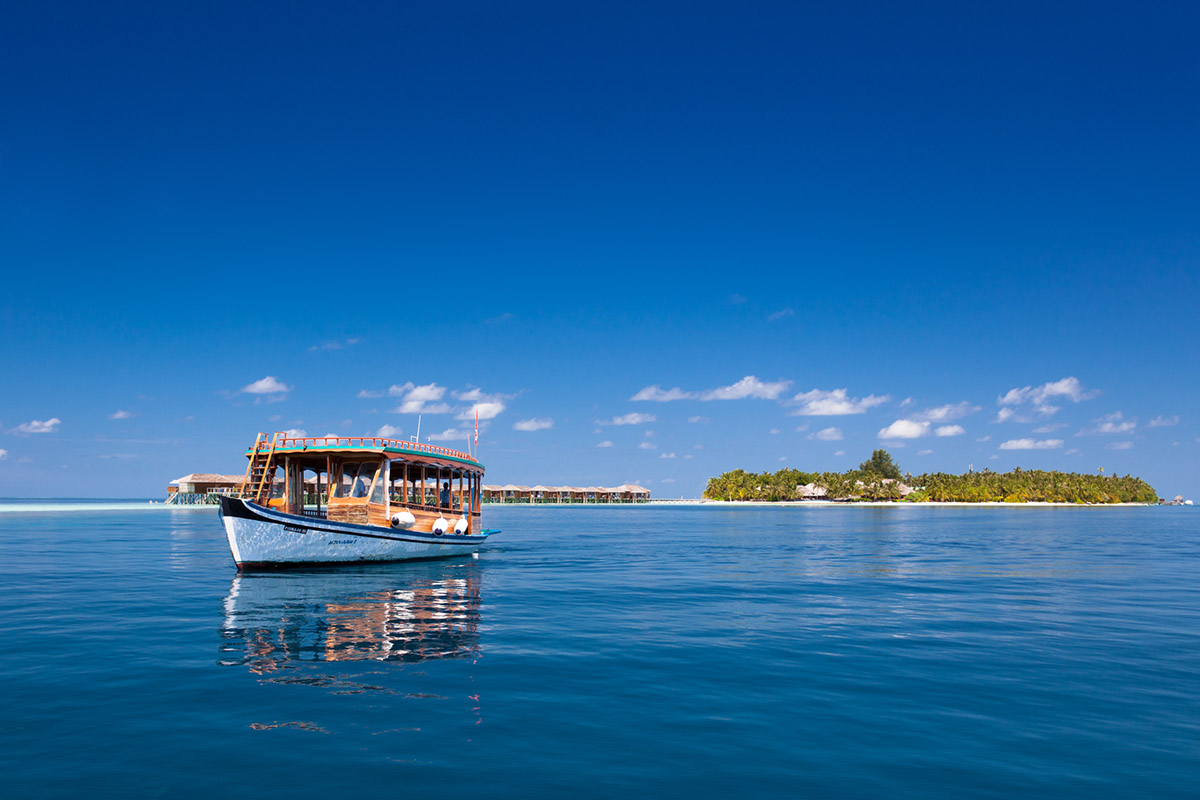
Dedicated Maldives liveaboard departures specially for families provide an extra special holiday for travellers of all ages. These visit suitable sites for children and adults looking to take their first breath underwater, and for junior open water divers who have restricted depth limits. Instructors are available to teach a variety of courses during the sailing. Other activities such as snorkelling and kayaking are also available. Discovering the Maldivian atolls in a safe environment opens up a myriad of marine creatures including manta rays, nurse sharks, turtles and more!
Philippines
Ready to suit up and jet set to the Coral Triangle? The Philippines is a world-class diving destination that your scuba family will talk about for years. Although the longest travel time of the choices previously listed, this year round destination will reward you for your efforts. Accessible from Manila, without any additional domestic flights, is Puerto Galera where the fantastic Atlantis Resort hosts family weeks. This includes discounts when you travel with children, including them stay and dive completing free! These weeks not only allow you to save money but also means there are guaranteed for other families to be there too, what’s better than making global scuba friends to plan the next adventure with?!
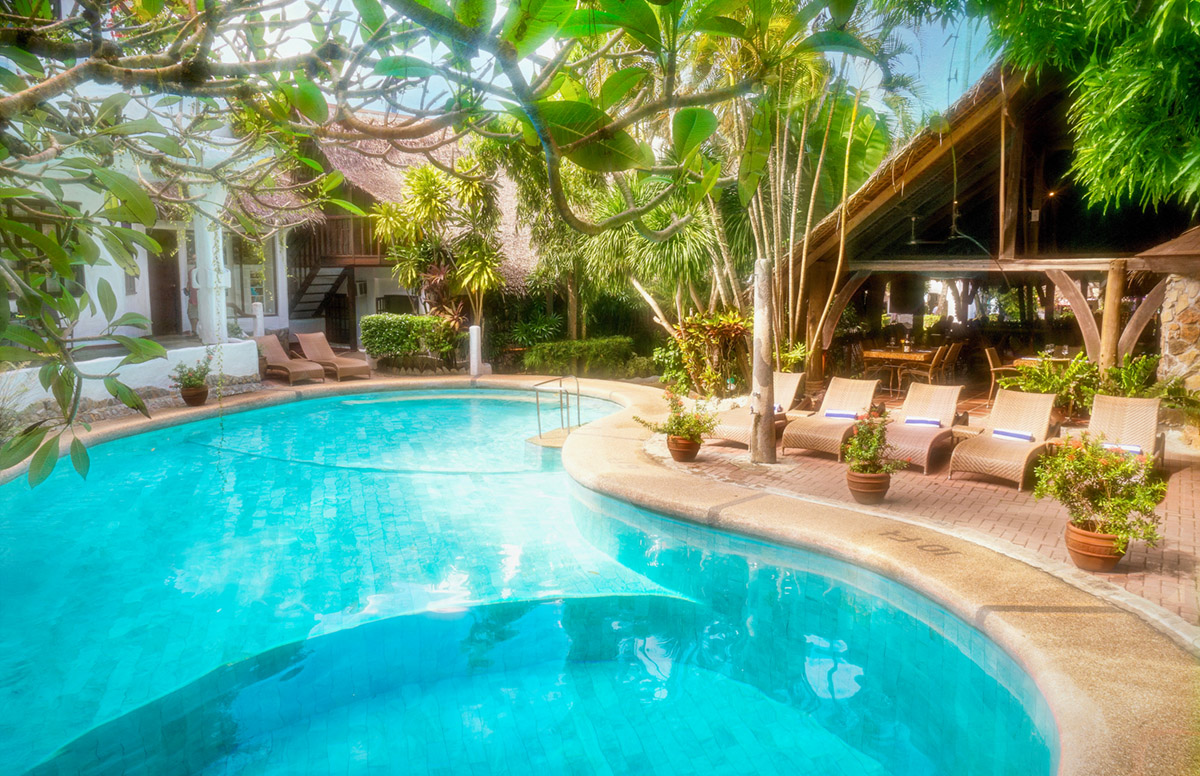
Our team are on hand to discuss your family’s requirements. Browse our junior diving courses, or for more information about family holidays, please call the Regaldive Team on 01353 659 999, or pop us an email, and we will be happy to help you choose the right destination for you.
Find a trip
- Resort
- Liveaboard
Red Sea Sale! Save up to £100pp
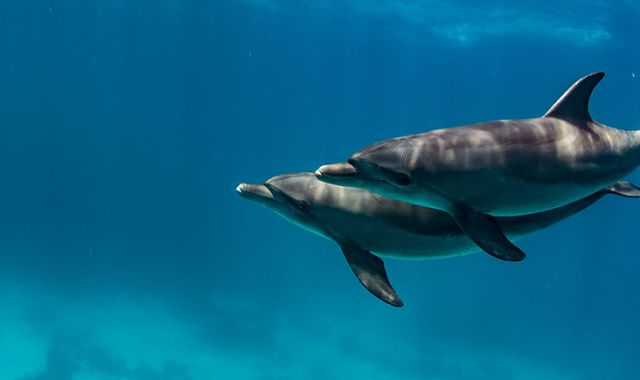
4 Feb 2025
The Egyptian Red Sea offers a truly unforgettable experience both above and below water. Enjoy the area’s unique combination of spectacular marine life, world-class diving, pleasant climate and stunning scenery. Head to the world-famous dive sites of Sharm El Sheikh, jump on one of our brilliant liveaboards or take a look at our excellent selection of resorts.
Example of savings
- Dive Ras Mohammed National Park, reefs & wrecks from £779pp
- Dive South & St Johns from £1,011pp
- Dive Sharm el Sheikh from £1,165pp
- Dive El Gouna from £1,295pp
- Dive Marsa Alam from £1,295pp
- Dive Soma Bay from £1,345pp
Terms & Conditions
- Please quote RSFEB25 at the time of your enquiry.
- Spend £750 or above and save £75, and when spending over £1,200 you can save £100!
- Valid for new bookings only.
- Not combinable with BSAC or loyalty discounts.
- Book before 24 Feb 2025
View all our Red Sea resort holidays or our liveaboard holidays. To find out more, contact our expert Dive team.
Find a trip
- Resort
- Liveaboard
Best Places to Dive with Manta Rays
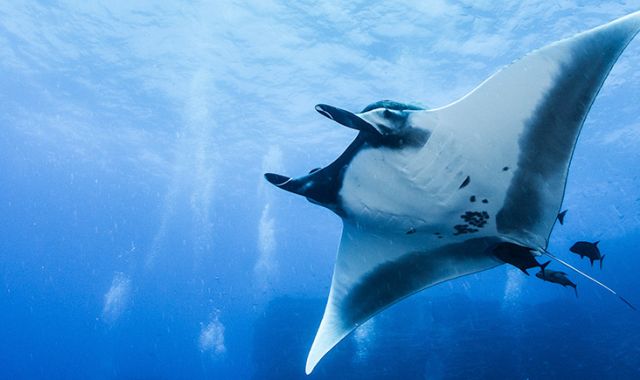
26 Jan 2025
Maldives
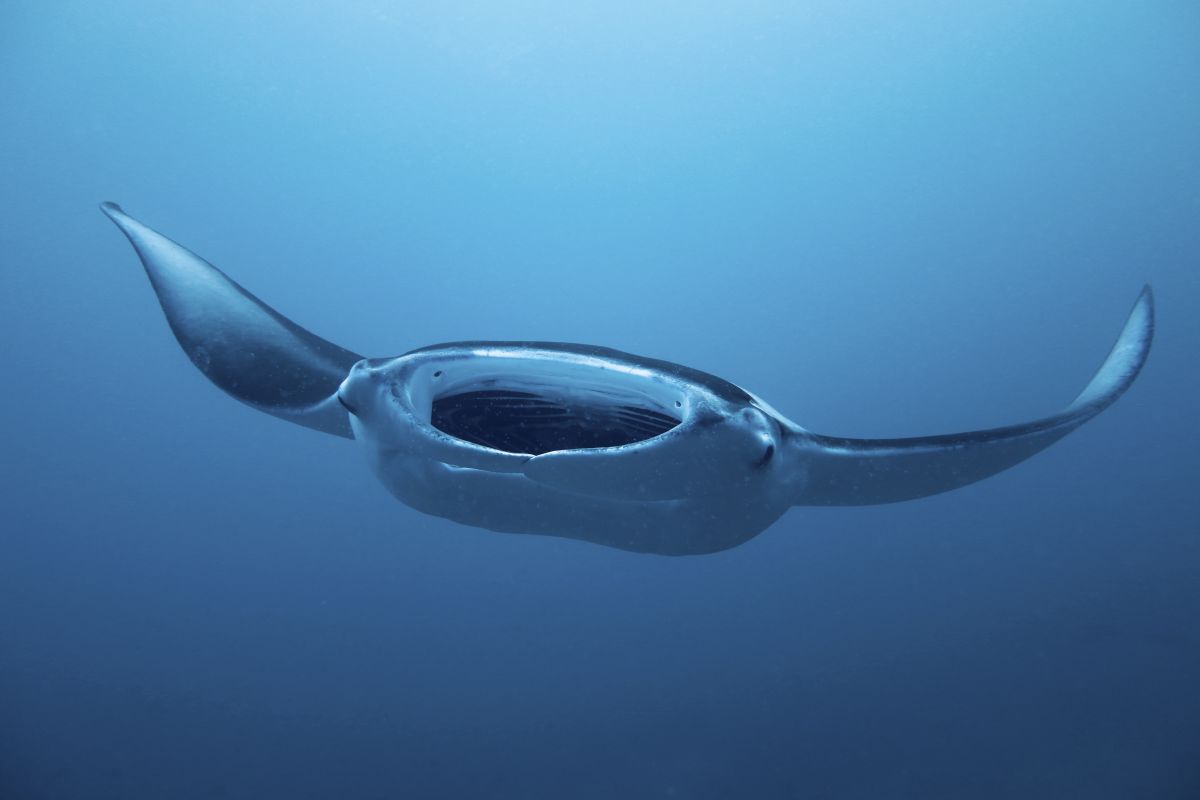
A renowned romantic getaway for some but a sensational scuba diving destination for us.
From 5-star luxury resorts and an increasing number of affordable options we’re confident we have a diving holiday to the Maldives that suits your budget. Manta ray encounters are common throughout the year, but there are certain areas which offer more reliable sightings especially when more plankton is present in the waters. One such area is the southern Ari Atoll. Vilamendhoo Island Resort has been a firm favourite over the years with its spectacular house reef just a few fin kicks away from the sun kissed beaches. In the later half of the year, mantas are often seen nearby. Built by divers, for divers, Boutique Beach offers an incredible diving experience for all. Mantas are regularly seen feeling in the lagoon and at the cleaning station at Rangali in the first few months of the year.
Perhaps you’d like to escape dry land altogether in which case you could hop on a liveaboard. We feature a selection of boats operating interesting itineraries throughout the Maldives visiting the best sites in season. Look out for itineraries such as ‘Pelagic Magic’ and Hanifaru & North’ where manta ray encounters are high on the agenda. Along with whale sharks, majestic mantas aggregate in Hanifaru Bay for the annual feeding frenzy (July to October). Encounters here are snorkelling only, but there are multiple cleaning stations nearby, so divers get the best of both! Learn more about our Maldives liveaboards and their itineraries here.
No matter how you choose to visit the Maldives, we’re confident that it provides one of the best opportunities to see mantas (particularly reef mantas) in the world.
Socorro
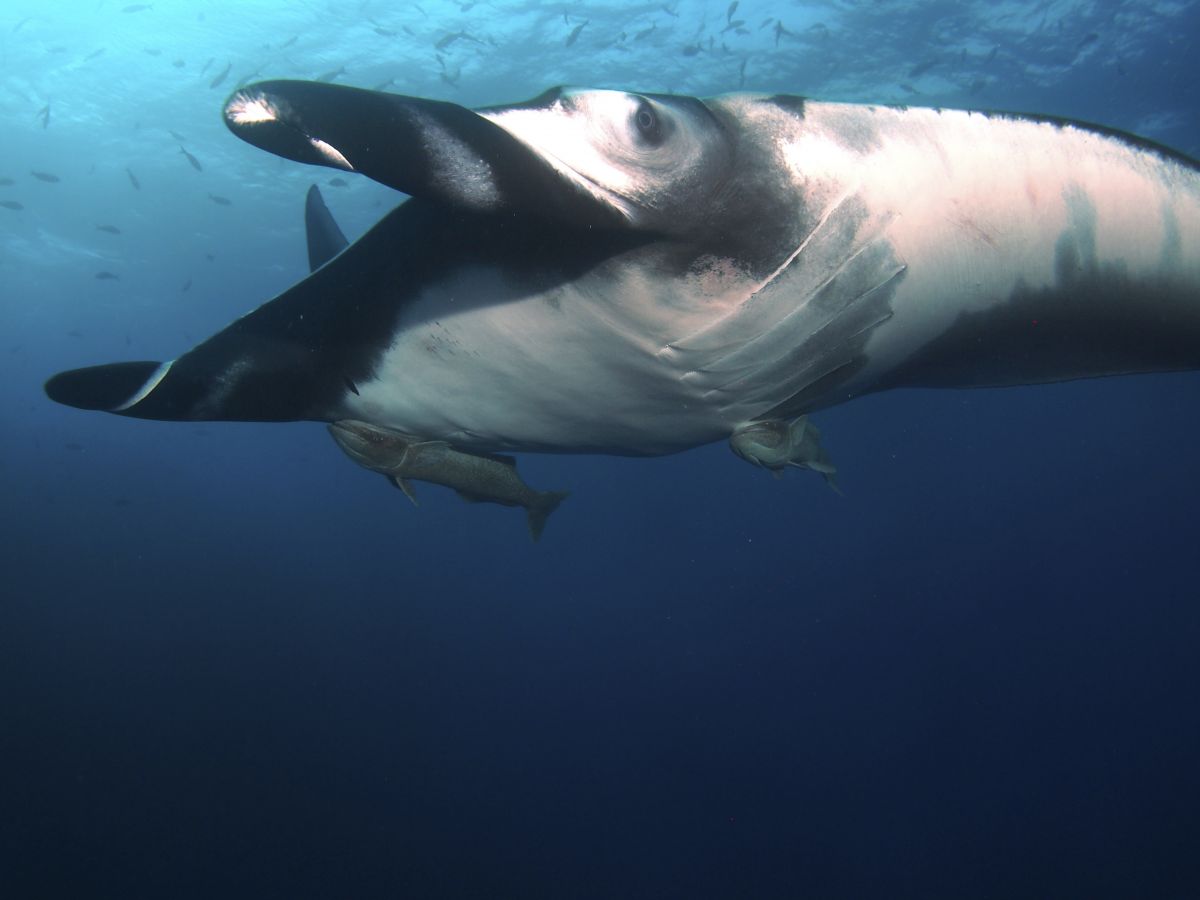
Image by Mat Howell
As diving destinations go, they don’t get much more remote than this! As long as you can stomach the 36-hour sea crossing, mantas (very big oceanic ones!) are as good as guaranteed in the waters around the islands that have become dubbed the ‘Galapagos of Mexico’.
Not only are the encounters almost guaranteed, from personal experience we can tell you that the giant Pacific mantas seem to enjoy interacting with divers at Socorro. I’d be very surprised if you did not come home telling stories of how one flew just inches over your head…again…and again!
Liveaboard diving only is the order of the day at Socorro and due to the potentially challenging conditions it’s recommended for advanced divers. We feature the two most reputable operators in the region; The Nautilus Fleet and the Pacific Fleet (Solmar V).
More than mantas, you can expect to see up to 10 different species of sharks and at the right time of year and if you’re very lucky indeed - even humpback whales! Socorro remains one of the best diving trips I’ve had the pleasure of taking and I’m sure you wouldn’t be disappointed either.
Find out more about diving in Socorro.
Galapagos
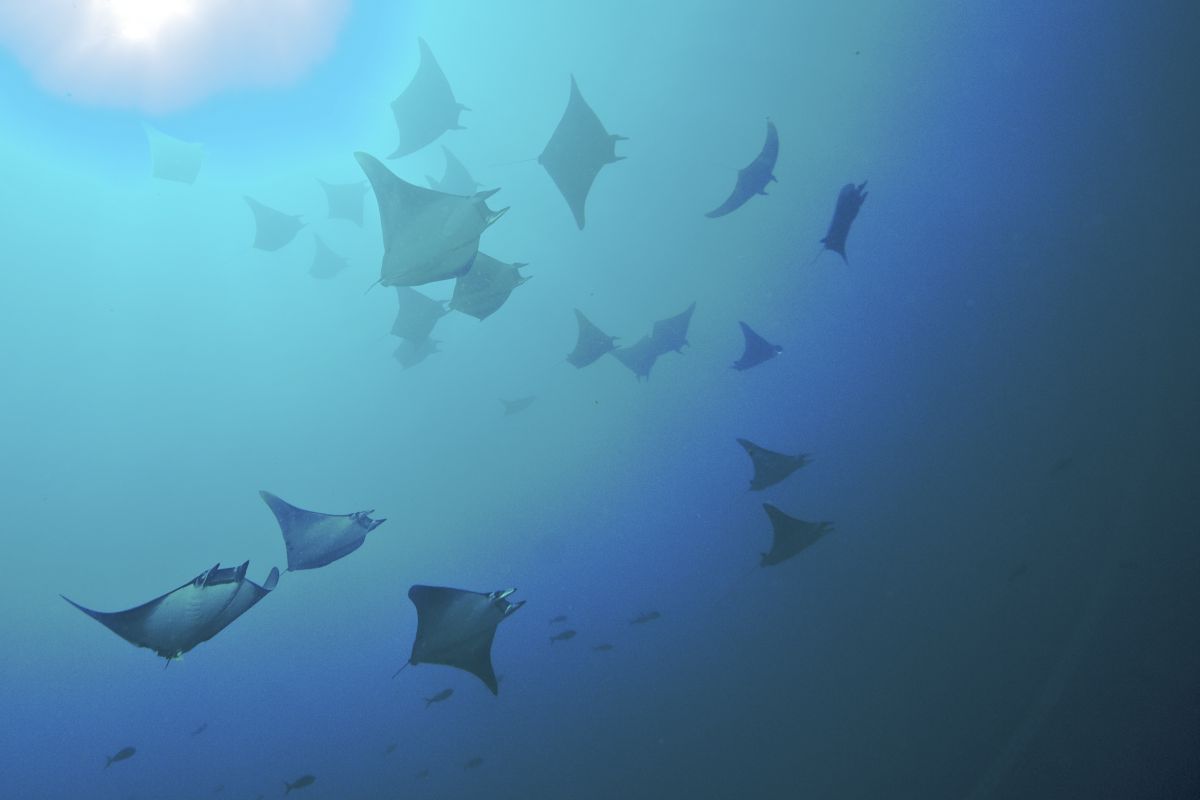
Image by Humboldt Explorer
The destination itself is synonymous with the expression ‘bucket list’. We don’t think we've ever met a single diver who does not dream of visiting the Galapagos someday; an undeniable mecca when it comes to pelagic encounters and much like Socorro, you can be almost guaranteed sightings of manta rays especially from December to May, in season.
Also, like Socorro, it’s more than ‘just’ mantas on the menu when you take to the water during this warmer season. Walls of scalloped hammerhead sharks are often sighted in their hundreds and several species of rays and sharks are seen around the islands. The marine life here is incredible and often unique. Spotting penguins and marine iguanas is also possible. We can’t leave without mentioning the other ‘gentle giants’ of our oceans. Some of the largest recorded whale sharks are seen up at Wolf and Darwin from June to November.
For divers, the best way to experience the Galapagos Islands is by liveaboard. The Humboldt Explorer spends four days at Wolf and Darwin and a dive at Cousins Rock, where mantas and devil rays are regularly seen. We feature five liveaboards in the Galapagos, all offering their own unique and memorable diving itinerary to suit a range of budgets. If you can stay longer, there's opportunity to extend your stay in resort to experience the topside wildlife too.
View all our Galapagos liveaboards.
Indonesia
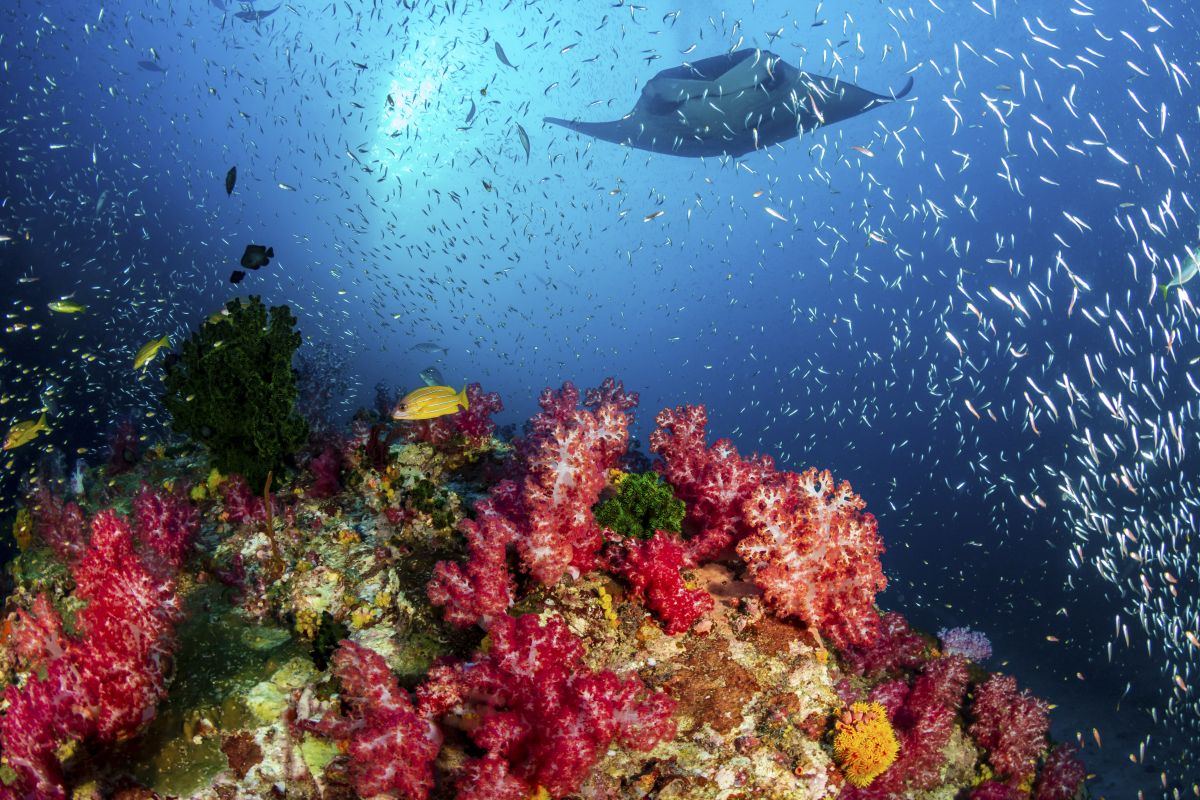
Diving opportunities with manta rays amongst the tropical islands of Indonesia are numerous. Lying at the heart of the Coral Triangle, the marine biodiversity is second to none. This makes it one of the most popular destinations for divers to visit, time and time again. The upwelling of nutrient rich water provides perfect feeding grounds and it’s at the cleaning stations nearby where divers have the best encounters. Both reef and oceanic manta rays are seen throughout the vast archipelago, but never together.
The most popular manta encounters in Raja Ampat are best visited by liveaboard during the months from November to March, but there are several areas nearby to resorts too. Oceanic mantas are regularly seen at ‘Blue Magic’ and 'Magic Mountain’ during these months. Both species can be seen throughout the year in Komodo National Park with numbers increasing with the plankton blooms. The most iconic site being ‘Manta Alley’, but there are others too. The region is best explored by liveaboard or from the comfort of a resort such as the spacious seafront Komodo Resort or Kalimaya Dive Resort. Click here to find out more about liveaboards in Indonesia.
There are other locations in Indonesia where you can encounter these enigmatic creatures. For those who like to get away from the world and seek big fish encounters, head to Derawan off the east coast of Kalimantan. The sites of Sangalaki Island are synonymous for manta ray encounters and there are plenty of other sites where pelagic encounters are commonplace. In addition, there are two sites off the coast of Bali where divers can observe mantas, namely at ‘Manta Point’ off Nusa Penida where a black manta is often seen at the cleaning station.
Find out more about diving locations throughout Indonesia .
Azores
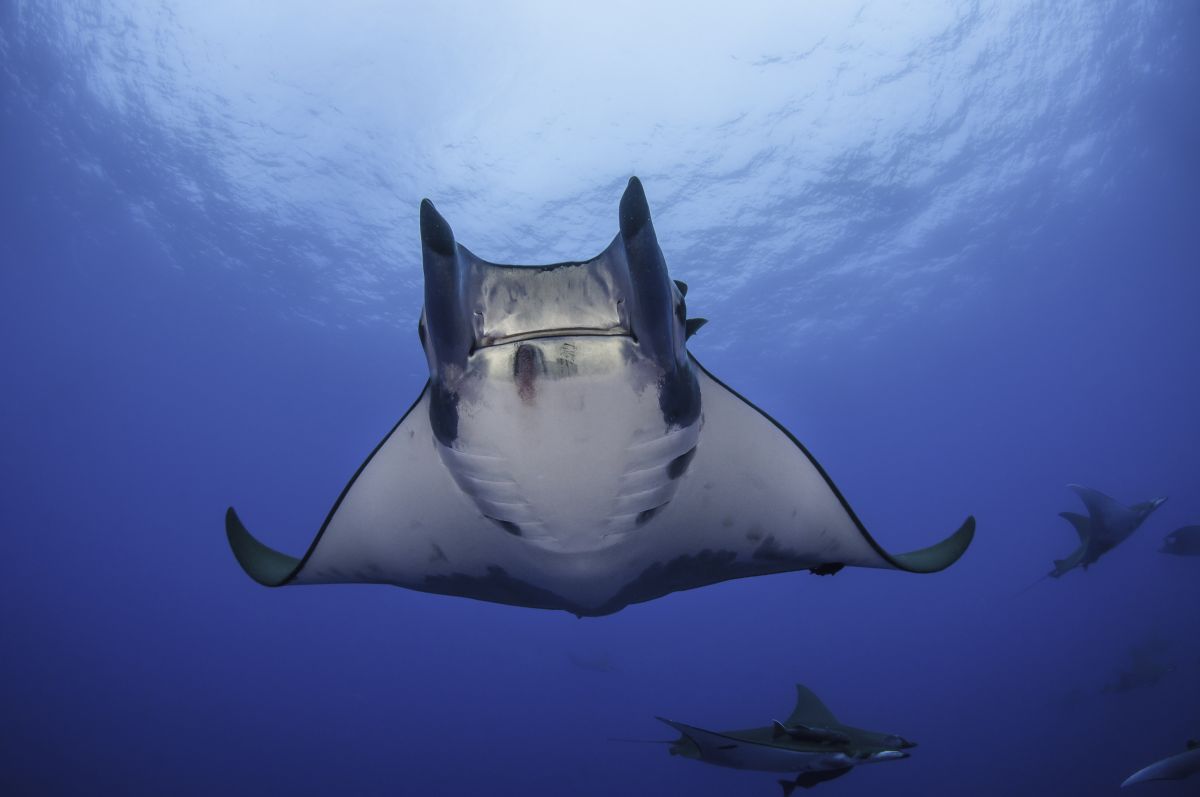
A little closer to home, the islands of the Azores are renowned for their seasonal pelagic encounters. The seamounts and dive sites such as Ambrosio (from Santa Maria island) attract devil rays in large numbers as they come to feed from June to October. Little is known about these shy and elusive creatures, but sicklefin and spinetail devil rays are often seen, as well as oceanic mantas; all members of the mobulid family.
Diving experiences in the Azores are suited to all. The volcanic topography provides homes for sub-tropical fish species and dramatic photographic shots. The seamounts provide a resting place for a variety of pelagic species and several species of whale can be seen on organised excursions (rare to see them underwater). In addition, each island has its own topside characteristics, making the Azores a great twin centre / island hopping destination.
Find out more about diving and topside adventures in the Azores.
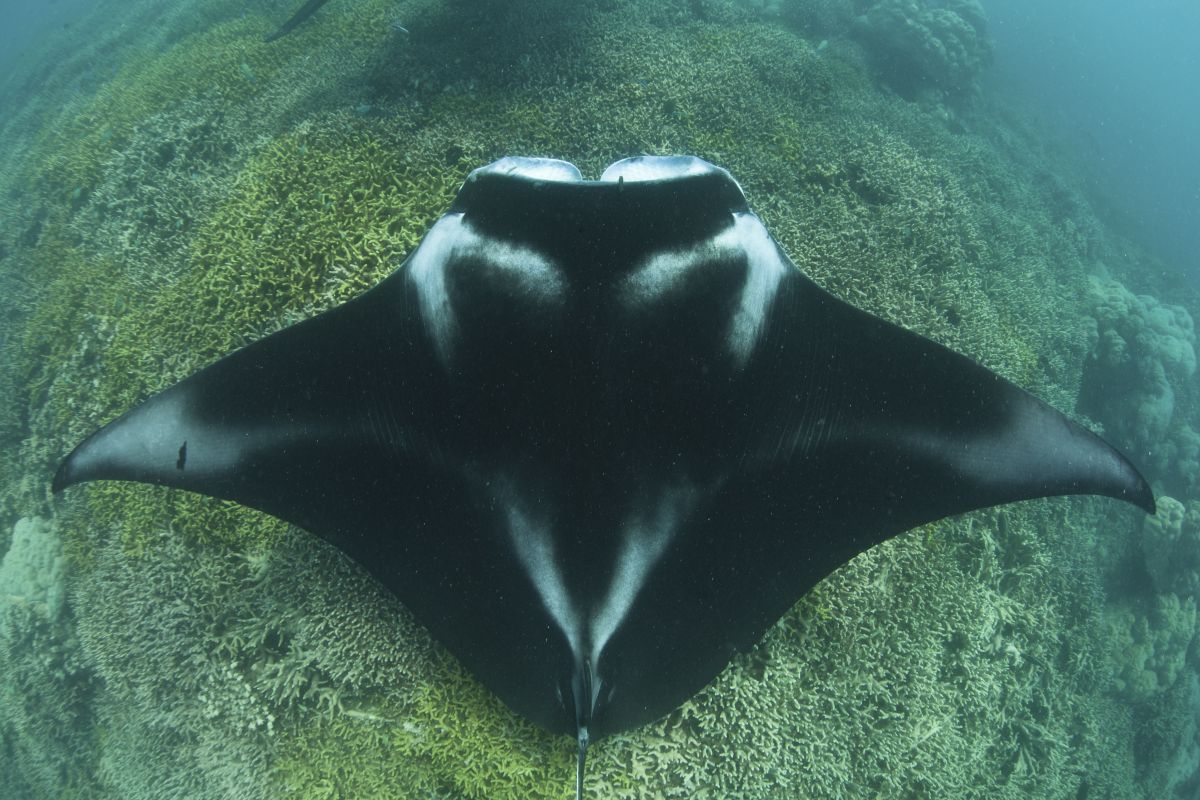
These are just five of the top destinations in the world for mobulid (manta and devil rays) encounters for divers, but there are of course many more places for you to consider. Some of these destinations attract fewer people, in some part due to the difficulty, time and/or cost to reach but they should not be ruled out. Yap in Micronesia is one such example, the Yasawa Islands of Fiji another. Recent legislation has provided protection for the reef and oceanic mantas in Mozambique. There’s a small population being researched near Alphonse Island in the Seychelles, and of course don't forget the famous night dive off Big Island in Hawaii.
If you’ve yet to share the water with the majesty that is a manta or devil ray, or if you’ve seen them dozens upon dozens of times, we believe you’ll never grow tired of such an incredible and memorable experience. Have a chat with our experienced team to discuss your options. Let’s get you back in the water for a mobulid encounter or two!
For those who are interested in learning more...
The Manta Trust plays a significant role in research and conservation as well as protecting rays throughout the world. They have projects in several destinations featured by Regaldive. Learn more about the mobulid family and the fantastic work of the Manta Trust.
Find a trip
- Resort
- Liveaboard
Top Destinations for Diving with Whale Sharks
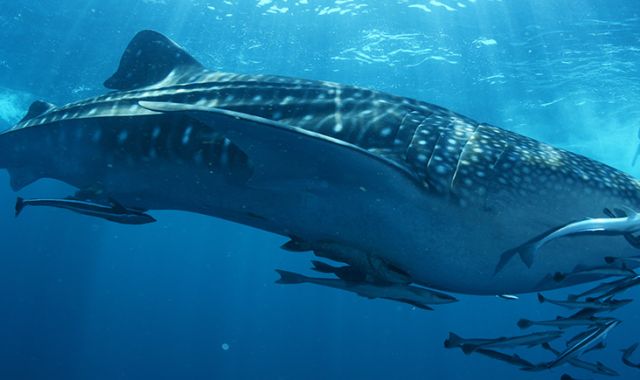
12 Jan 2025
These enigmatic and graceful giants are more often seen close to the surface, making that elusive encounter possible for divers and snorkellers alike. Despite their elusive nature and endangered species status, we're delighted to report that whale shark awareness is on the increase, and we have confirmed sightings from Regaldive divers holidaying in Egypt, Oman, Maldives, Philippines, Galapagos, Azores, Indonesia and other destinations around the world.
We've put together a couple of options for those looking to maximise their chances of an underwater encounter with these gentle giants on a range of whale shark tours. Just don't forget your camera!
Where to dive with whale sharks?
Maldives
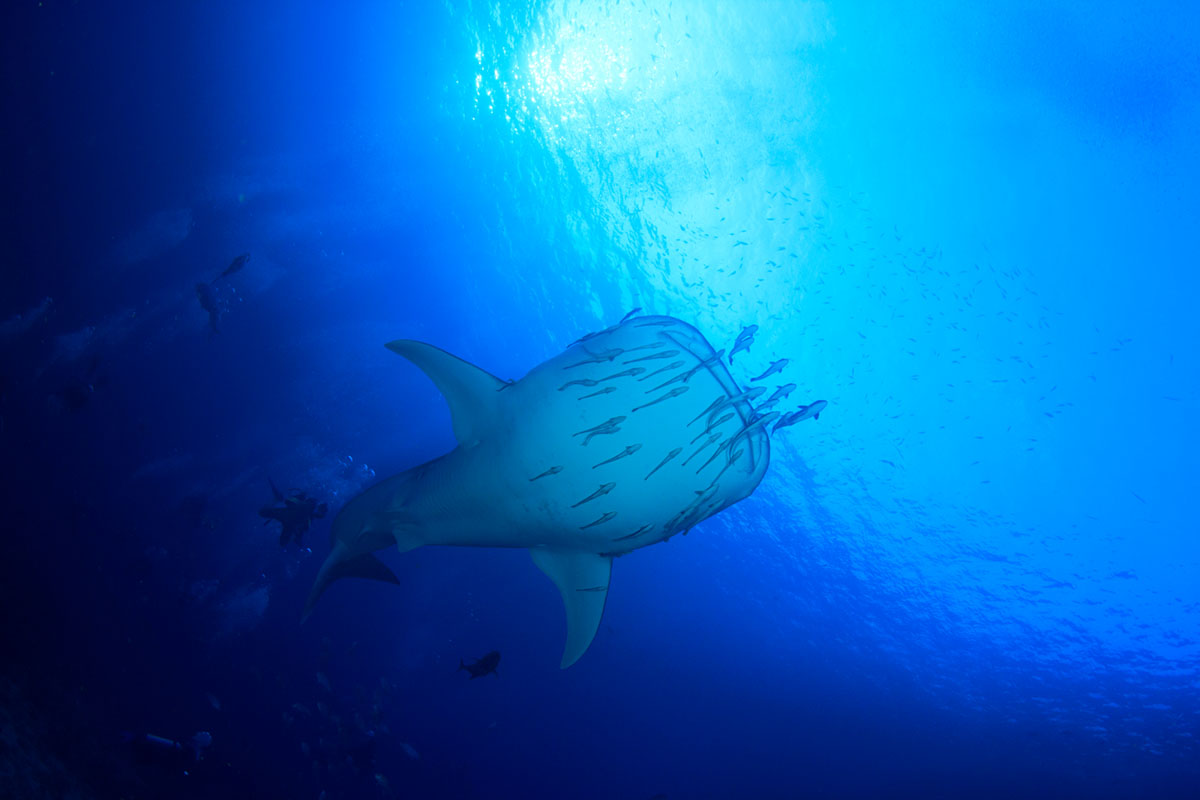
In the Indian Ocean archipelago of the Maldives, there are several dive sites where you can reliability swim with whale sharks alongside other large marine life in warm tropical waters. Throughout the year plankton rich waters attract the world’s biggest fish, meaning diving with whale sharks has a very high success rate.
Dhigurah Island, located in the South Ari Atoll is on the edge of a marine protected area, a famous whale shark region where these beautiful creatures can be seen all year round. Visitors to Boutique Beach Hotel can enjoy warm tropical waters and palm trees while going out on dives and whale shark snorkelling tours to encounter these amazing creatures.
Further north in Baa Atoll, seasonal plankton blooms from July to October attract manta rays in their hundreds. The nutrient rich water attracts other pelagics, such as whale sharks, to the UNESCO World Heritage Site of Hanifaru Bay. Here, only snorkelling trips are allowed in the bay itself, in an effort to help ocean conservation. Those staying at Reethi Beach Resort have an excellent likelihood to dive with whale sharks and manta rays.
Galapagos
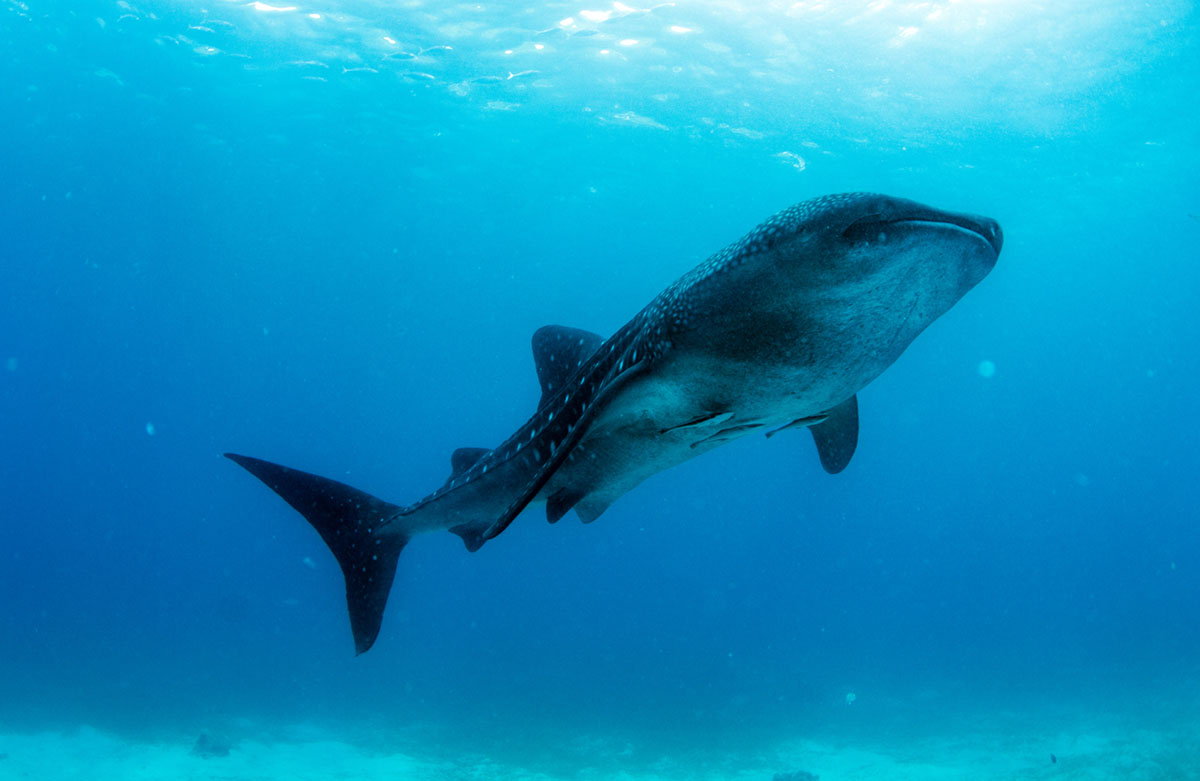
For more experienced divers, the Galapagos Islands are recognised as one of the world's best locations to encounter adult whale sharks in large numbers, specifically between May and November. Galapagos liveaboard trips journey around the archipelago and dives at Wolf and Darwin Islands, where seasonal sightings of whale sharks and other pelagic species are common. Declared a marine protected area in 1998, the Galapagos Island Marine Reserve covers almost 200,000 km² and is on many scuba divers bucket list, by travelling during the plankton blooms in the summer months you’ll have a good likelihood of diving with whale sharks.
In this area it’s also possible to see hammerheads sharks, silky sharks, and Galapagos sharks around Darwin Island and on the main archipelago marine iguanas, Galapagos penguins, sea lions, and a variety of endemic bird species.
Mexico
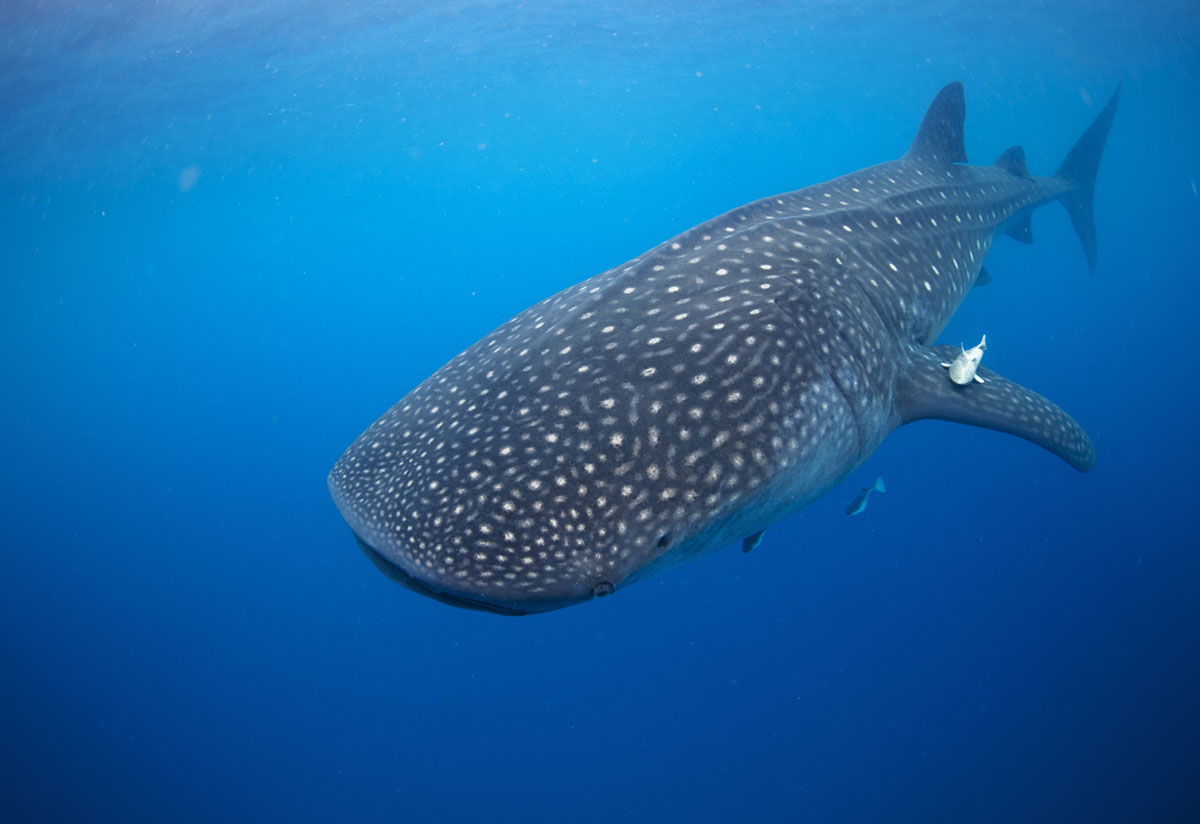
Mexico has multiple options for whale shark encounters. With Baja California bordering the Pacific coastline and the Caribbean Sea encircling the Yucatan Peninsula, there's plenty of ocean to uncover.
Starting on the western coast is Baja California, there are two options for whale shark sightings. The Sea of Cortez is a haven for pelagic species and larger sea creatures. The nutrient rich waters fluctuate throughout the year, so if you want to witness whale sharks gather, the best time is from late November through to March. Liveaboard trips to Socorro Islands for more advanced divers, and those with their sea legs, from May-July diver can see oceanic manta ray and bait ball, and it’s also the best time for whale shark encounters.
On the Yucatan Peninsula the best time to spot whale sharks is from June to September, around Isla Mujeres. During the summer months snorkelling tours depart daily with almost guaranteed success rates of spotting the whale shark aggregation. It's not uncommon to have manta rays, turtles, and dolphins show up too! Isla Mujeres is park of a 85km2 marine park, and is arguably one of the best places in the world to see whale sharks.
Indonesia
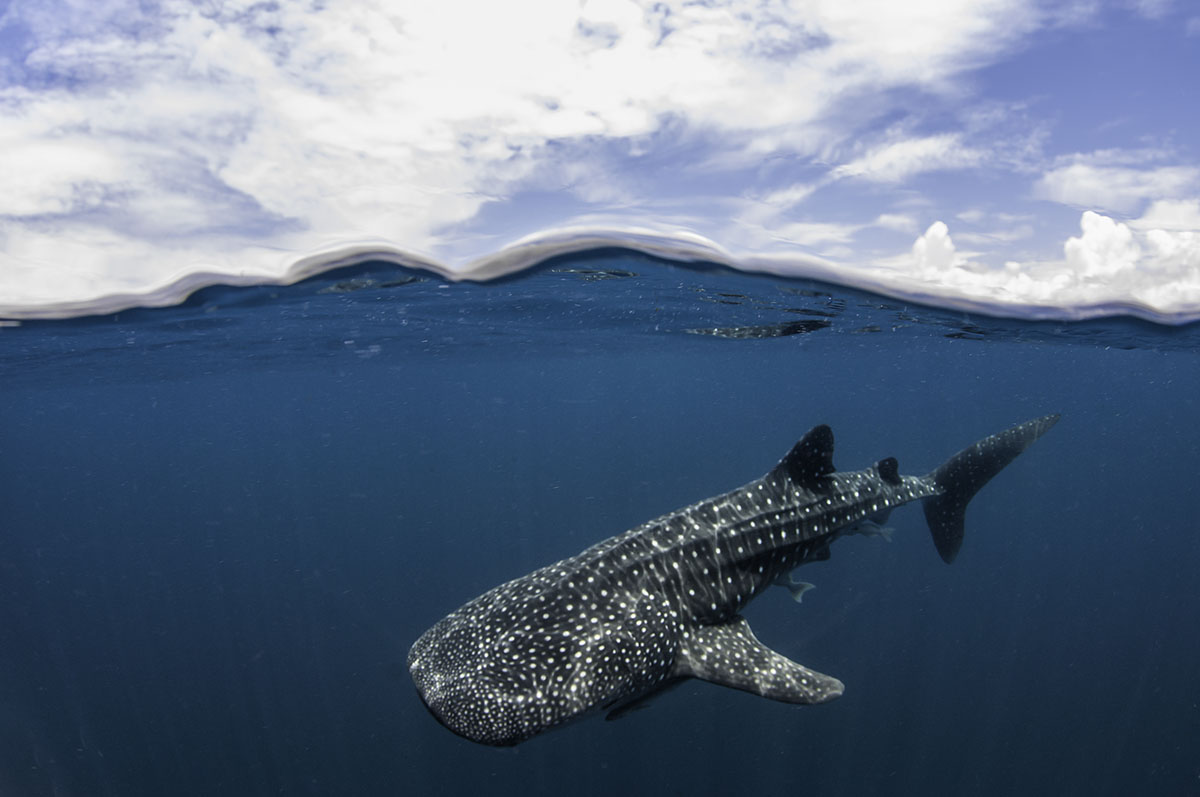 In Southeast Asia, the tropical waters of Indonesia’s Coral Triangle deliver again. Not only whale sharks are seasonally spotted around the archipelago, but also large marine life such as manta rays, hammerhead sharks, and reef sharks can be seen while scuba diving.
In Southeast Asia, the tropical waters of Indonesia’s Coral Triangle deliver again. Not only whale sharks are seasonally spotted around the archipelago, but also large marine life such as manta rays, hammerhead sharks, and reef sharks can be seen while scuba diving.
The best chance of spotting whale sharks in Indonesia is by liveaboard. Sailings are able to reach further afield and into the whale sharks natural habitat, Cenderawasih Bay and Triton Bay are reporting regular sightings in summer and winter respectively. For hundreds of year 'jukung' - traditional fishing vessels - have been shark’s main focus, as local believe the majestic creatures to be sacred and split their catch. This ancient relationship has also aided conservation efforts, as scuba divers and snorkellers alike are keen to see this beautiful friendship.
Whale sharks can also been seen close to national park of Komodo. The Mermaid I and Mermaid II vessels are swinging by Saleh Bay on their way back to port to offer snorkelling and diving with whale sharks. The nutrient rich waters of the bay attract whale sharks and have an excellent success rates.
Tanzania
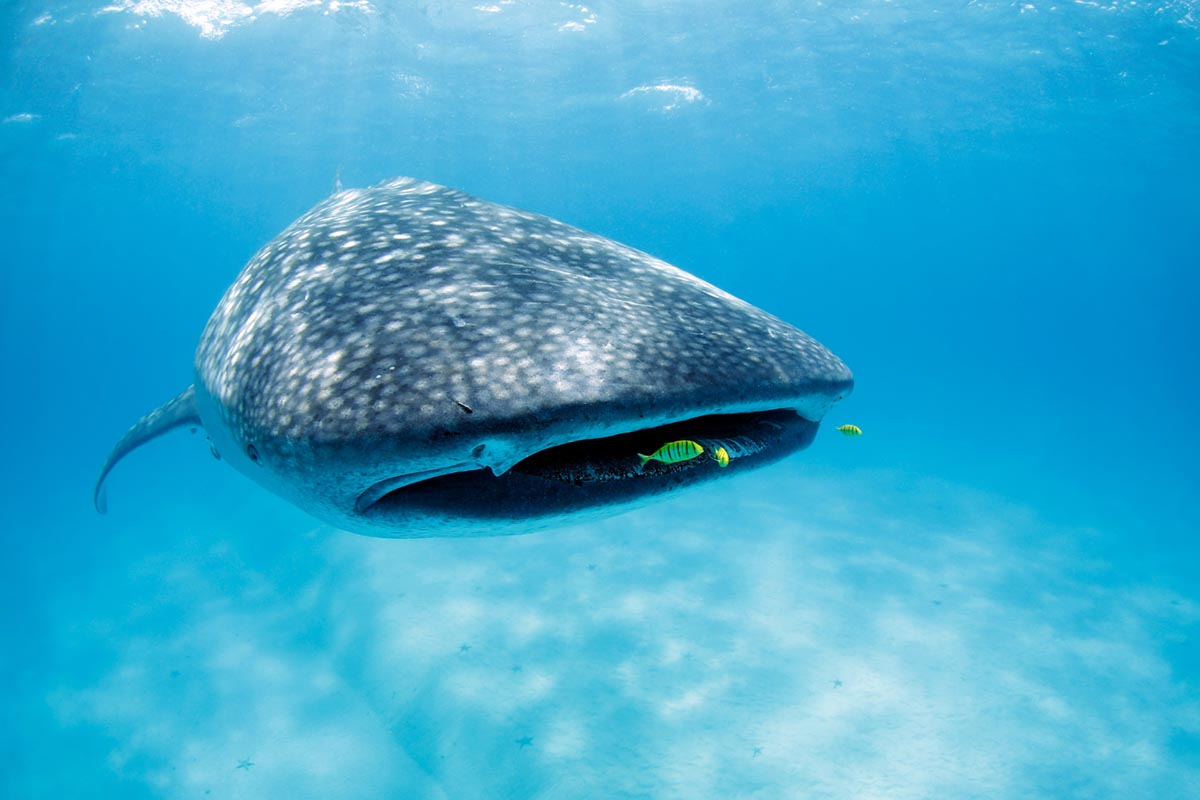
On the Indian Ocean side of Africa, off the coast of Tanzania, lays Mafia Island. The waters around this island are a marine protected area, with seasonal plankton blooms occurring from late December through to March, attracting whale sharks as they feed. Successful snorkelling tours throughout this time, providing opportunity to snorkel with whale sharks. More common in this area are juvenile whale sharks, but for the largest fish in the ocean, they still measure 3–10 metres in length.
The scuba diving is also wonderful in this area, with strong tidal currents Mafia Islands waters are rich with marine life. Off the beaten track, this destination offers culture, peace and quiet, and whale shark sightings.
To organise your whale shark diving holiday, or for more information, please contact our friendly, specialist team on 01353 659999.
Find a trip
- Resort
- Liveaboard
Top Dive Resorts & Liveaboards for 2025, as Chosen by you
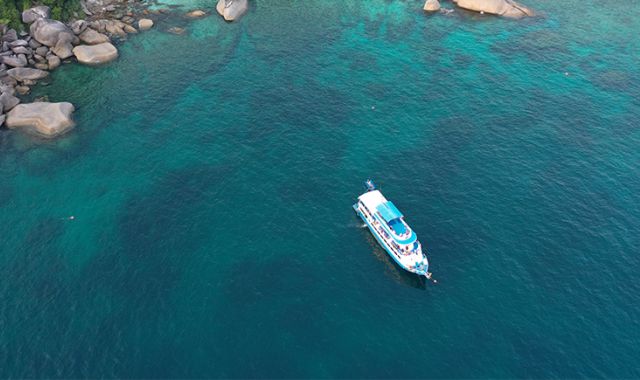
13 Dec 2024
Read the full list below, or scroll down to see the recommended dive resorts, liveaboards and dive centres.
Dive Resorts
Siladen Resort & Spa
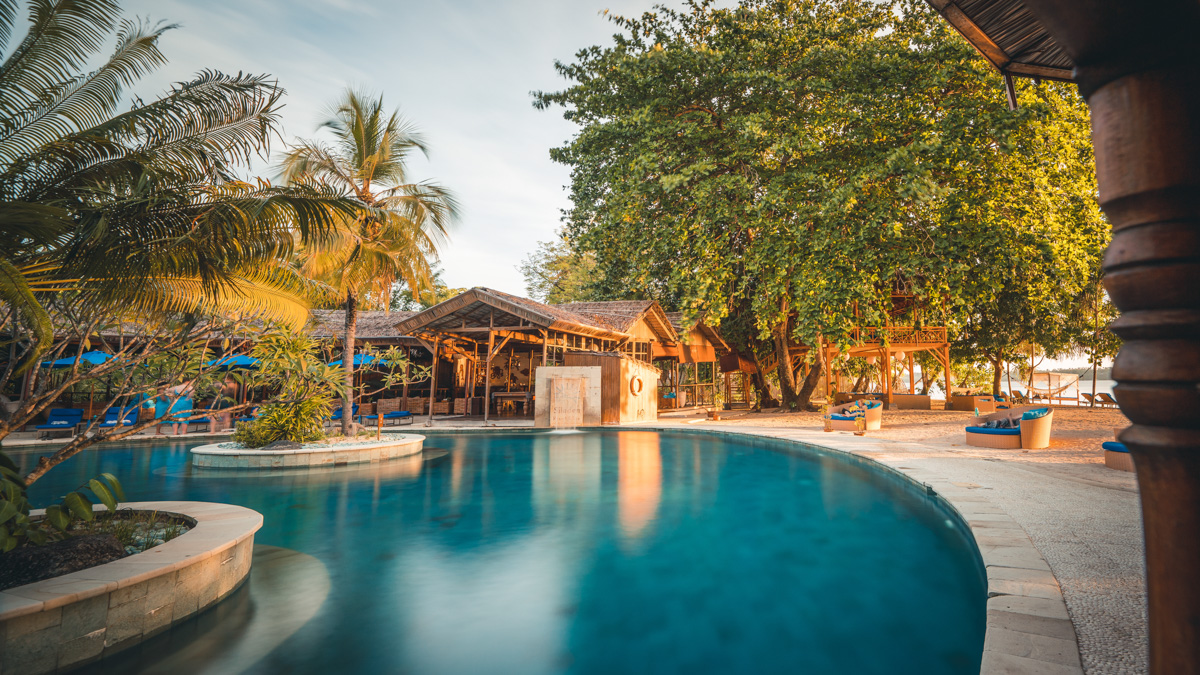
Image by Maximillian Schwarz
Based on the tranquil Indonesian island of Palau Siladen in the heart of Bunaken National Park, Siladen Resort & Spa offers an ideal retreat for divers and snorkellers seeking a peaceful getaway.
Diving in the region is world-renowned, with Bunaken National Marine Park offering wall and drift dives across 22 dive sites, whilst the nearby Lembeh Strait is one of the finest destinations in the world for macro and photography enthusiasts.
With its exceptional food, welcoming atmosphere and stunning location it’s no wonder this resort is a favourite amongst our clients.
“Siladen was excellent, very comfortable and of a high standard. The food options were really good and we never got bored of trying new things and eating the local cuisine and delicacies. Of course, what really makes these places is the people and all of them were so friendly and helpful. They really couldn’t do enough for you!” – Allan F.
Vilamendhoo Island Resort
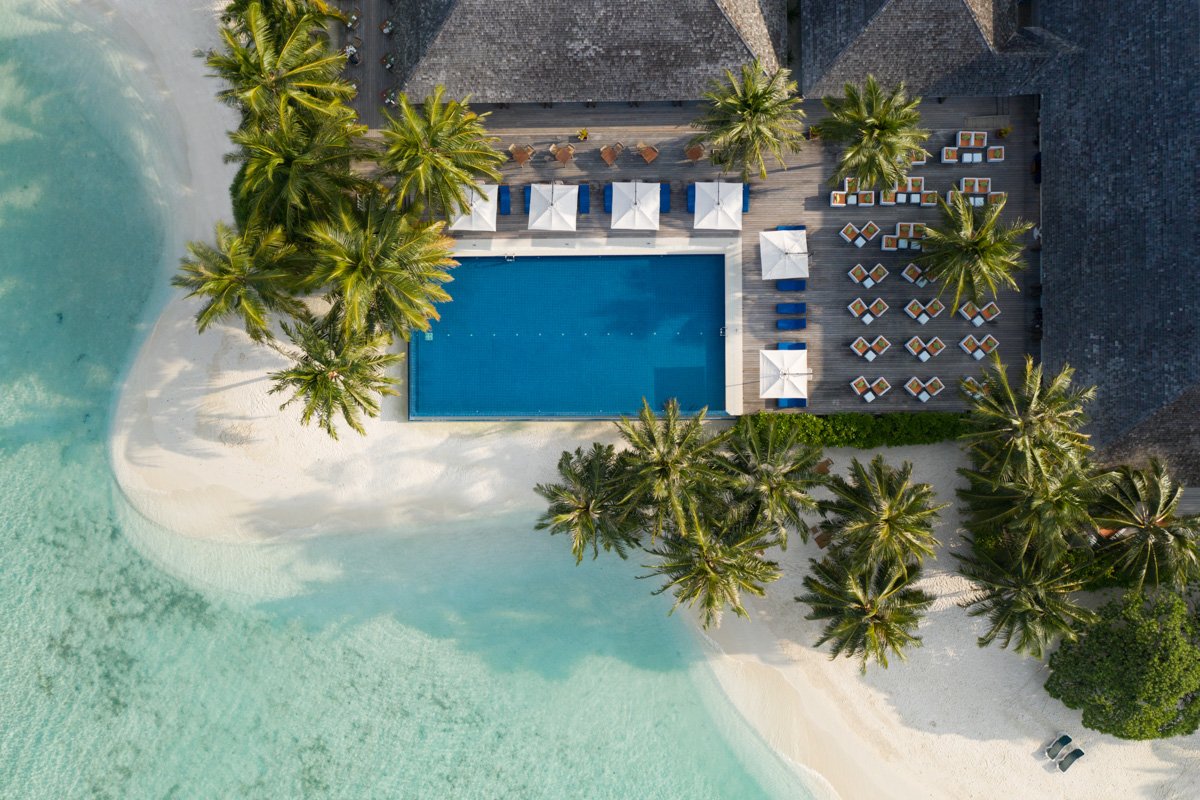
Image by A.Shuau
Nestled on the idyllic island of Vilamendhoo in the Maldives, Vilamendhoo Island Resort & Spa offers guests an incredible tropical escape. As the island’s only resort, it boasts long stretches of white sandy beach, creating the perfect setting for both relaxation and adventure.
The resort’s house reef is excellent with several shallow caves and overhangs, and twice a day three to four boats operate to a variety of the 40+ dive sites within a 60-minute trip of Vilamendhoo. Snorkelling off the island is also some of the best in the Maldives, and the dive centre has won awards for its service, making this a diver’s paradise.
“Vilamendhoo was great. We especially loved the spa and the house reef.” – Alison W.
Dive into Lembeh

Designed with divers in mind, Dive into Lembeh Resort is located at the northern end of the Lembeh Strait and provides guests with a personal and intimate experience. With just nine private bungalows, each with a sea view, and three budget longhouse rooms, the resort has been likened to a comfortable ‘land-based liveaboard’ —combining the best of both worlds in a tranquil setting.
Famous for its muck diving on the black volcanic sand reefs of the Strait, Dive into Lembeh Resort provides opportunities to spot some weird and wonderful underwater critters. The surrounding waters are home to two of the most famous dive sites in Lembeh, ‘hairball’ and ‘aw shucks’, offering fantastic diving on the resort’s house reef.
“We chose a sea view bungalow which was very quiet and comfortable and we enjoyed having hot tubs on the balcony and air conditioning inside.” – Ian D.
Siddhartha Ocean Front Resort & Spa
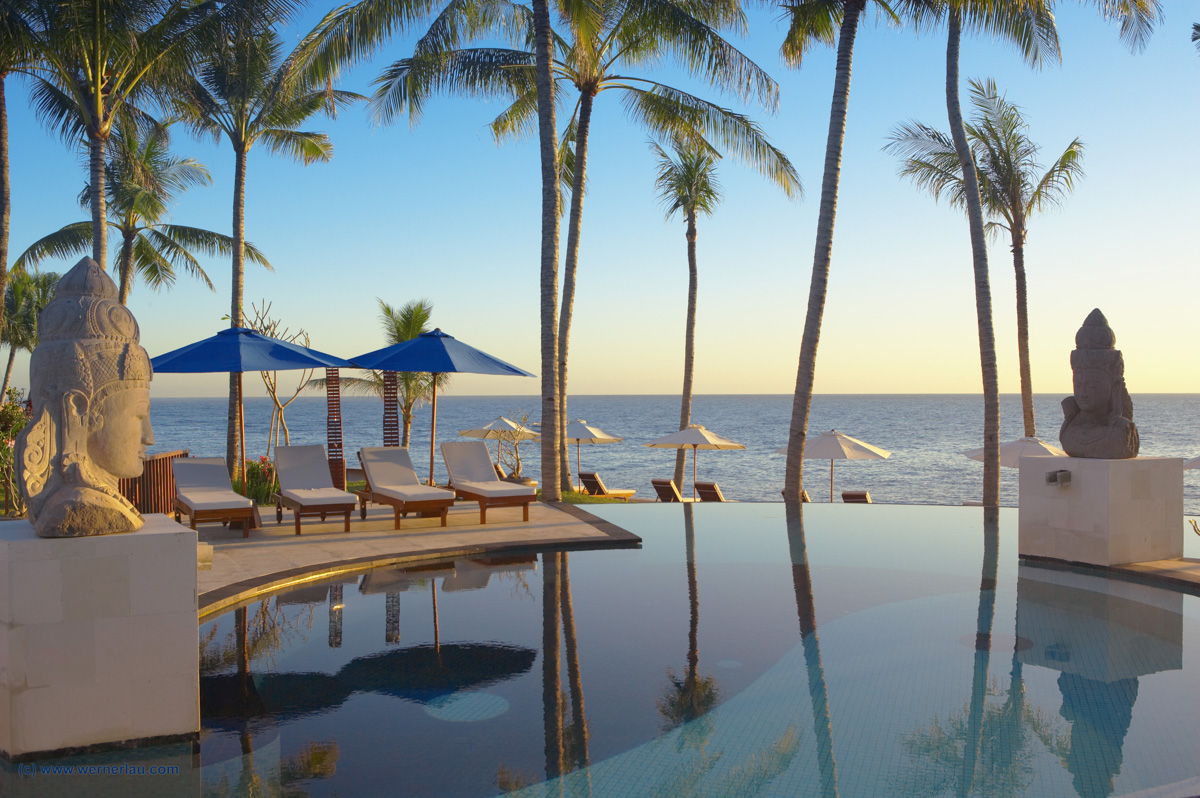
Combining the best of Balinese and Western design, Siddhartha Ocean Front Resort & Spa is a luxurious resort situated directly on the beach in the small village of Kubu. The atmosphere at the resort is informal and relaxed - ideal for those seeking an authentic escape to relax and rejuvenate.
This fantastic dive resort has access to an impressive house reef and dive centre on-site, plus guests can explore over 30 diverse dive sites that can be reached from the island. These range from the current-swept sites off Menjangan island where sightings of Napoleon wrasse, greater barracuda and sharks are common, through to the calm waters of Secret Bay, where macro enthusiasts can encounter seahorses, ghost pipefish, dragonet and many more. The USS Liberty wreck at Tulamben which is beautifully colonised with marine life is another must-see dive spot nearby.
Camel Dive Hotel
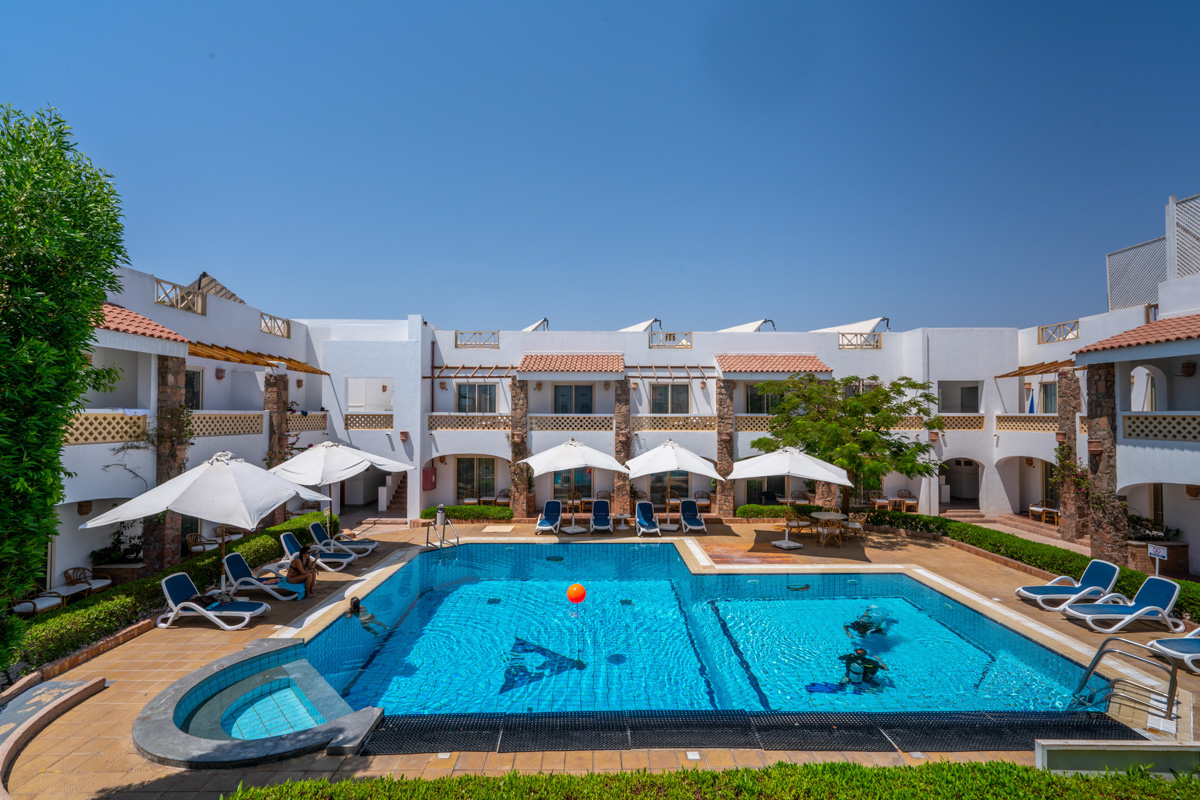
Camel Dive Club & Hotel is an award-winning divers’ hotel in the heart of the picturesque Naama Bay, offering a blend of comfort, sustainability and adventure. As a proud Green Fins member, the hotel is committed to being environmentally friendly with the initiative focused on educating and empowering tourists to reduce pressures on coral reefs.
The hotel has a well-known dive centre on-site, and Sharm El Sheikh offers a spectacular range of dive sites that are amongst the best in the world. From the famous Ras Mohammed Marine Park which attracts legions of experienced divers each year, to many easily accessible coral gardens that offer safe, shallow waters and excellent visibility perfect for beginners, the region caters to all diving levels and abilities.
“We really enjoyed the breakfast, great roof bar and central location in Sharm” – Ian K.
Breakers Divers & Surfers Lodge
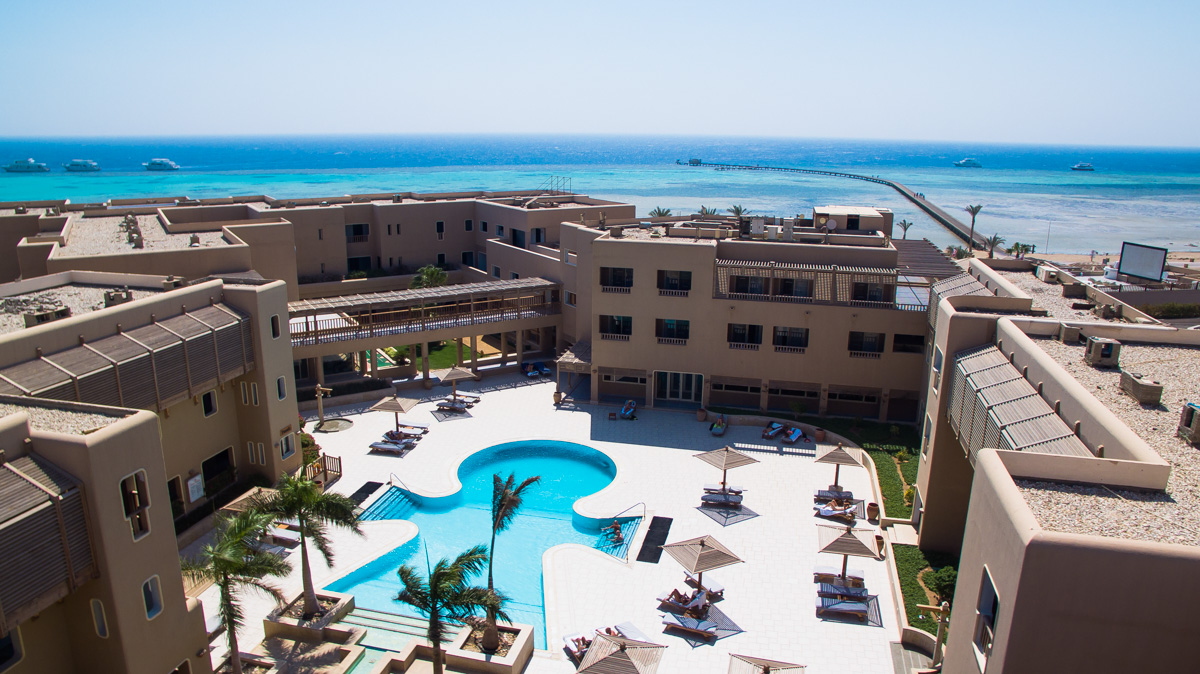
The Breakers Diving & Surfing Lodge is Egypt’s first ‘water sports lifestyle’ hotel, perfectly situated just steps away from the water’s edge. The hotel is directly opposite the magnificent Soma Bay house reef and adjacent to the well-equipped Orca Dive Centre, making it ideally located for diving enthusiasts.
Soma Bay gives access to some of the best dive sites in the Red Sea, and the diverse marine life and vibrant corals are a delight for all experience levels. The sheltered lagoon at the front provides waters ideal for training, while more qualified divers can venture to the nearby Panorama Reef, a real highlight of the area.
Having won numerous prestigious awards including the TripAdvisor Travellers Choice Award 2024, the Breakers Divers & Surfers Lodge offers an unbeatable blend of world-class diving and exceptional service.
“The room was very quiet and comfortable with good air-conditioning, and the shower was excellent!” – Maria J.
Papua ParadisE Eco Resort
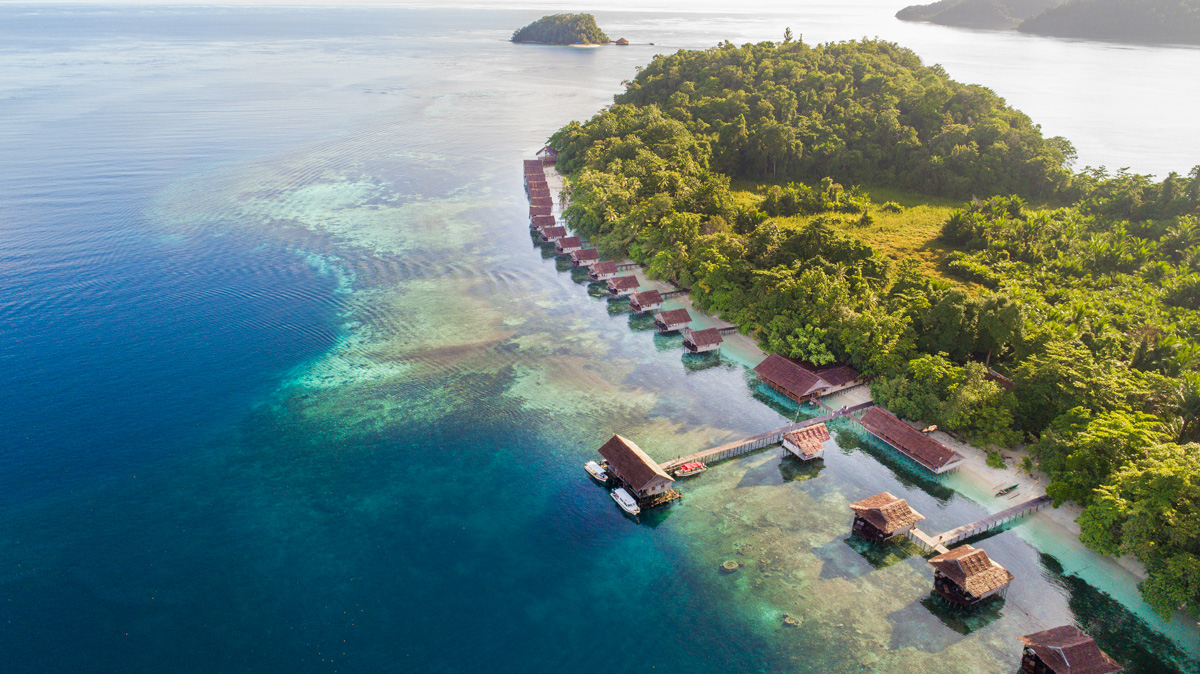
Papua Paradise Eco Resort truly lives up to its name. Built with locally sourced, traditional materials, the resort has stilted overwater bungalows which appear to float above the sparkling waters of the island’s vibrant house reef. Guests can unwind on their private balconies and enjoy endless ocean views until the sun sets.
The resort’s house reef offers fantastic snorkelling opportunities within the stunning archipelago of Raja Ampat, with the area famed for its rich diversity of reefs which are among Indonesia’s best. Suitable for more qualified and experienced divers, the area is a photographer’s dream where you can expect manta rays, wobbegong sharks, turtles, mackerel, a variety of colourful nudibranchs and more.
Magic Island Dive Resort
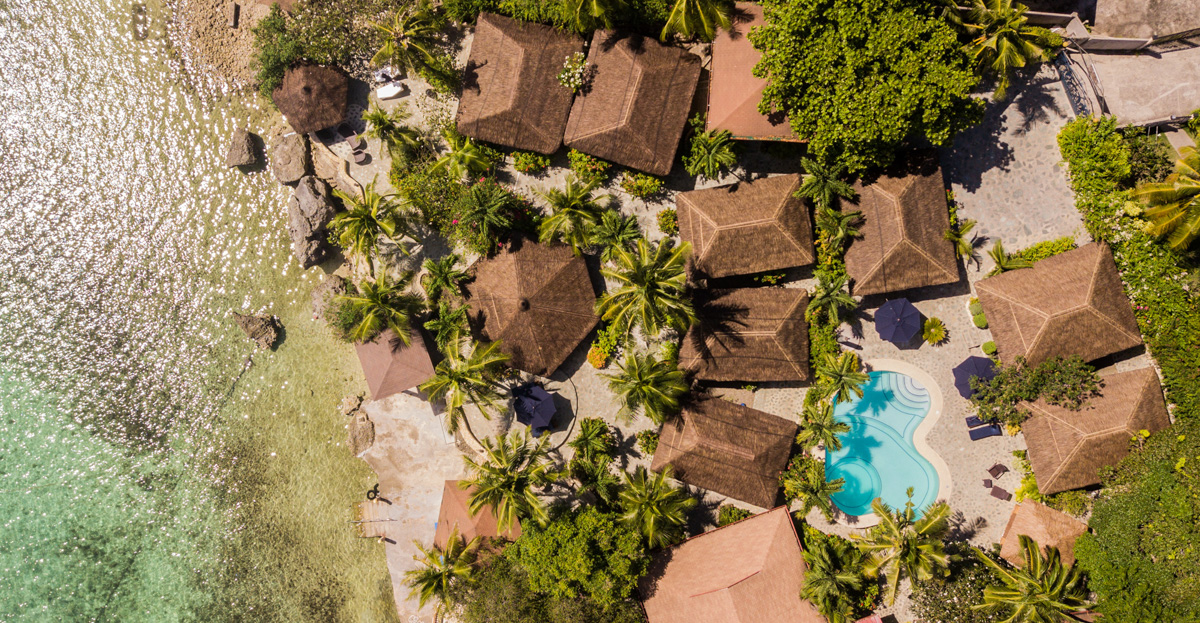
With a prime location in the scenic coastal town of Moalboal, a stay at the Magic Island Resort provides exceptional diving experiences like no other and beckons scuba diving enthusiasts wishing to immerse themselves in the vibrant marine life of Moalboal.
A scuba divers’ paradise, Moalboal has at least 25 stunning dive sites offering an array of thrilling underwater adventures. One of the main highlights is the remarkable coral reefs, and divers can explore the renowned Pescador Island—a marine sanctuary bursting with colourful coral formations and an impressive variety of marine species. The on-site dive centre also caters to divers of all levels, providing scuba diving courses and packages with diving starting at the house reef.
Liveaboards
Blue Melody Liveaboard
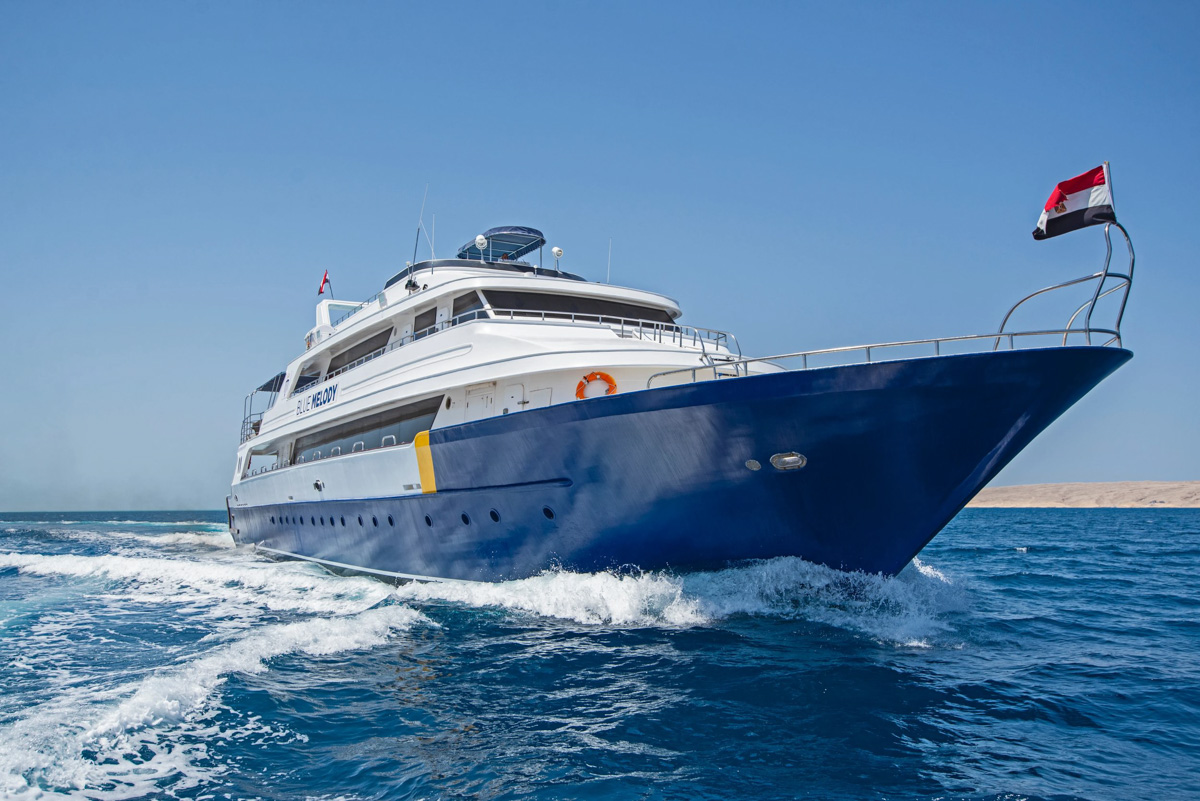
Accommodating up to 26 divers in a 38-metre, luxury custom-built liveaboard, Blue Melody is a spacious vessel offering ample room to relax in between dives on a variety of Red Sea itineraries.
Choose from exciting options such as ‘Northern Wrecks & Reefs’, ideal for those new to the Red Sea to experience its world-famous wrecks and pristine reefs. Or for a slightly more challenging dive, the ‘Deep South’ route allows divers to experience a more ‘untouched’ Red Sea. Additionally, Blue Melody offers a variety of other Red Sea itineraries to suit your diving goals.
On board the ship, all cabins are en suite and the well-equipped dive deck boasts two Bauer Mariner compressors and Nitrox membrane systems to help optimise your dive. After a day exploring the underwater world, relax on one of the two large sun decks and soak up some sun in the peaceful surroundings.
“Blue Melody was very clean and the cabin was a lovely size. We really enjoyed the diving and it was all fantastic.” – Lisa C.
Carpe Vita Liveaboard
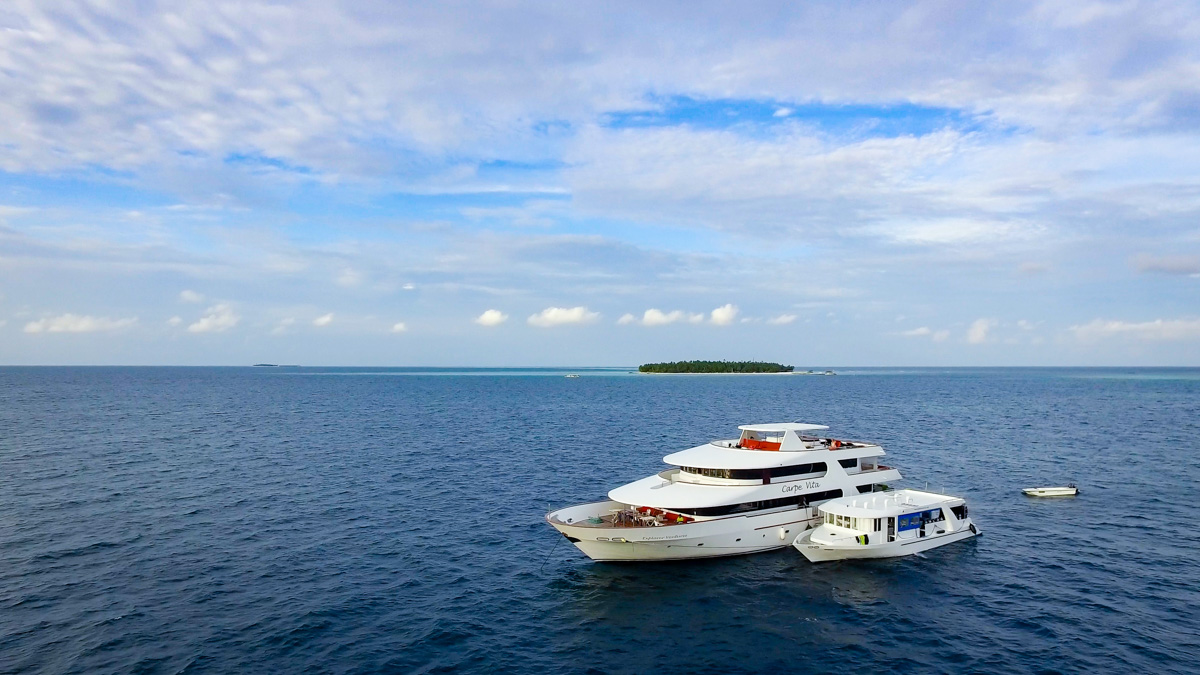
Based in the Maldives, M/V Carpe Vita offers another beautiful and spacious liveaboard experience for up to 20 guests, ensuring plenty of space to relax while you take in the beautiful colours of the Indian Ocean.
Operating a variety of itineraries in both South and North Male Atoll, Ari Atoll, Vaavu and more, trips on Carpe Vita typically provide divers with a mix of reef, wreck, channel and drift dives. You can expect warm waters, with the chance to see colourful corals as well as encounters with sharks and manta rays.
Dives are carried out from the yacht’s dhoni and the well-equipped dive deck includes fresh water showers, a toilet and complimentary nitrox for qualified divers.
“The staff, food and accommodation were excellent. We definitely had no complaints about the accommodation.” – Peter S.
Seascape Liveaboard
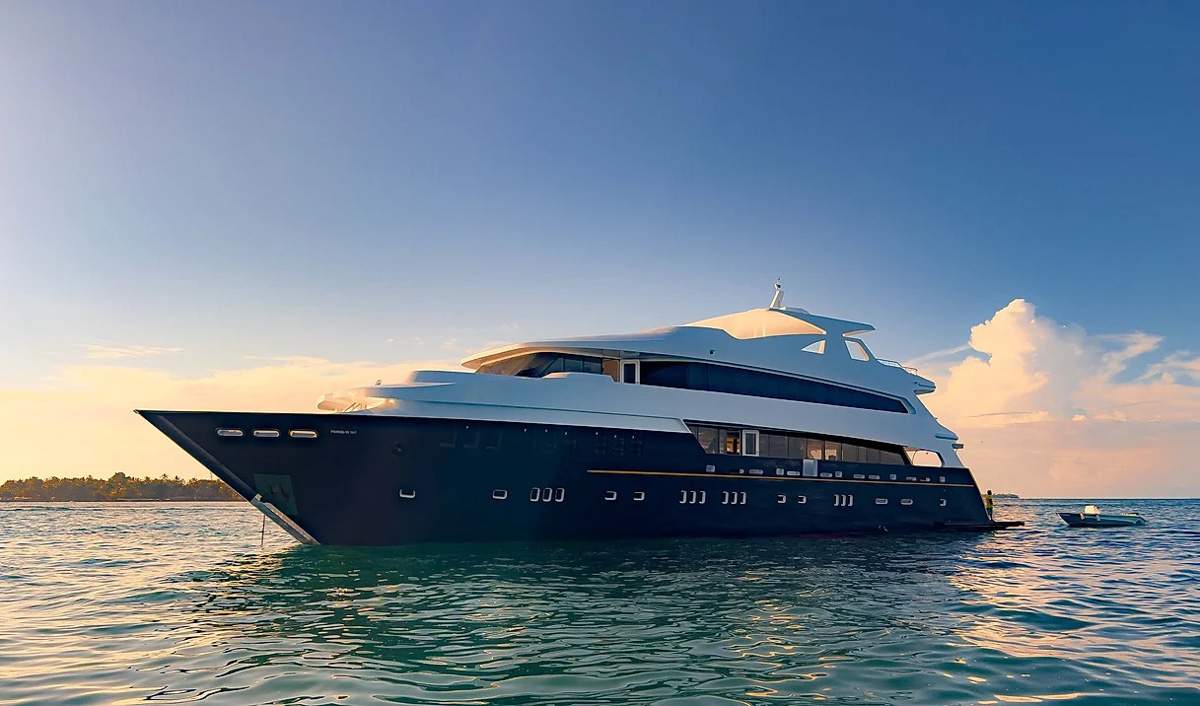
Recently launched in 2023, Seascape is a state-of-the-art Maldives liveaboard that redefines luxury and sustainability. The vessel has high-end amenities including a hot tub and serene lounging area, and each cabin is designed for maximum comfort with air-conditioning, en suite bathrooms and breathtaking ocean vistas.
The crew on board Seascape are very experienced with the Maldivian waters and their knowledge will significantly enrich your trip. They run a variety of itineraries throughout the year, with ‘Central Atolls’ and ‘Best of Maldives’ offering picture-perfect routes full of rich, colourful reefs and a ‘Deep South’ itinerary delivering shark dives.
The ship focuses on eco-friendly practices and includes energy-efficient technologies to ensure minimal environmental impact. Combined with luxurious comfort, Seascape offers an indulgent yet sustainable diving experience in the Maldives.
Oman Explorer
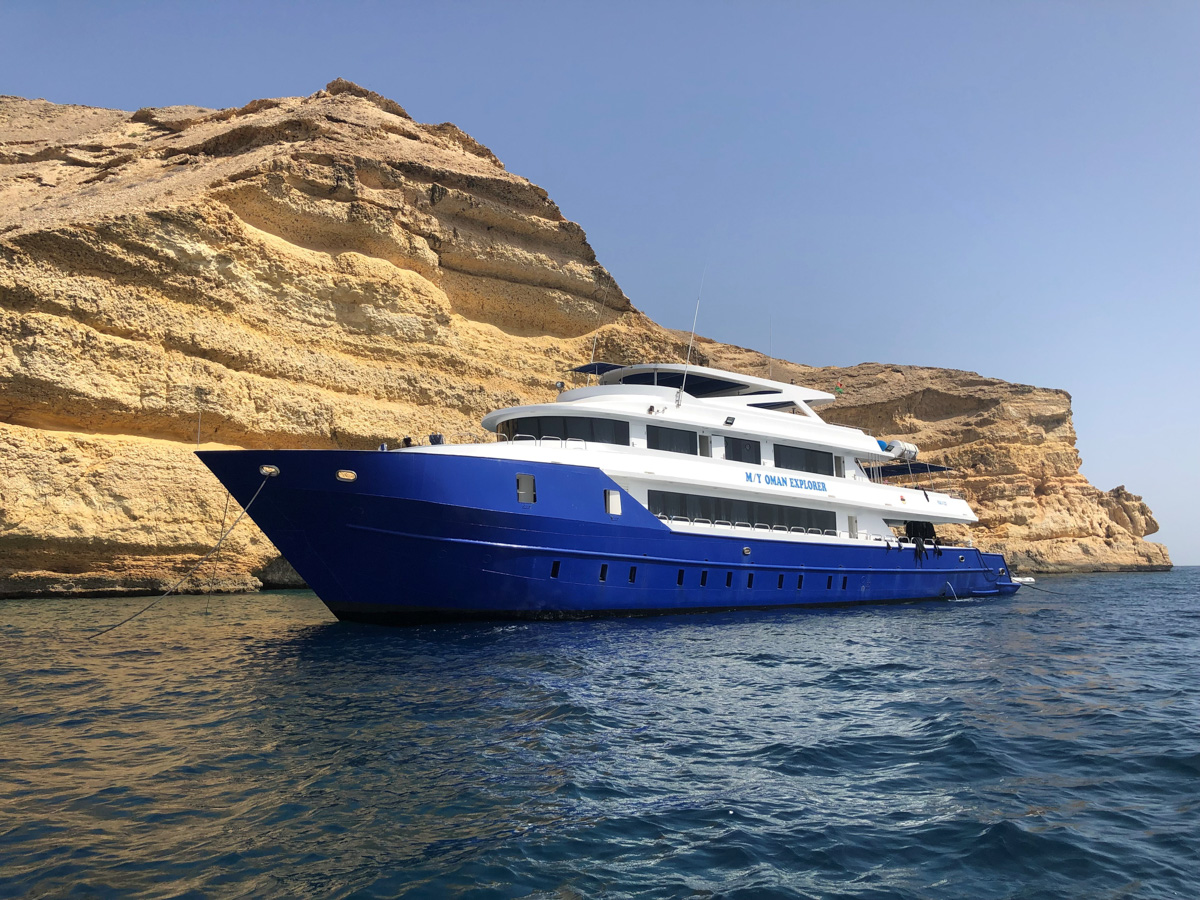
The spacious Oman Explorer offers a liveaboard diving adventure far away from the crowds. Comfortably accommodating 22 divers in ten twin cabins and one master cabin, the vessel ensures a relaxed experience.
Liveaboard itineraries switch during the year to offer the best diving in each region of Oman, with Northern itineraries running between June and November to sites such as the Daymaniyat Islands, offering flourishing coral reefs when water temperatures are at their warmest, and Southern itineraries offered during the winter months to the Hallaniyat Islands, providing more adventurous diving opportunities.
Diving is done directly off the vessel’s dive deck or from a RIB (dive site dependant), and Nitrox is available. On board, there’s a spacious sun deck and a large comfortable fly deck, as well as a separate area for relaxing in front of the wheel house giving guests plenty of options to unwind.
“The standard of the boat was very good and the quality of the diving was excellent. The general condition of the dive sites was fantastic and we enjoyed seeing octopus, squid and whale sharks.” – David S
Dive Centres
Maltaqua Dive Centre
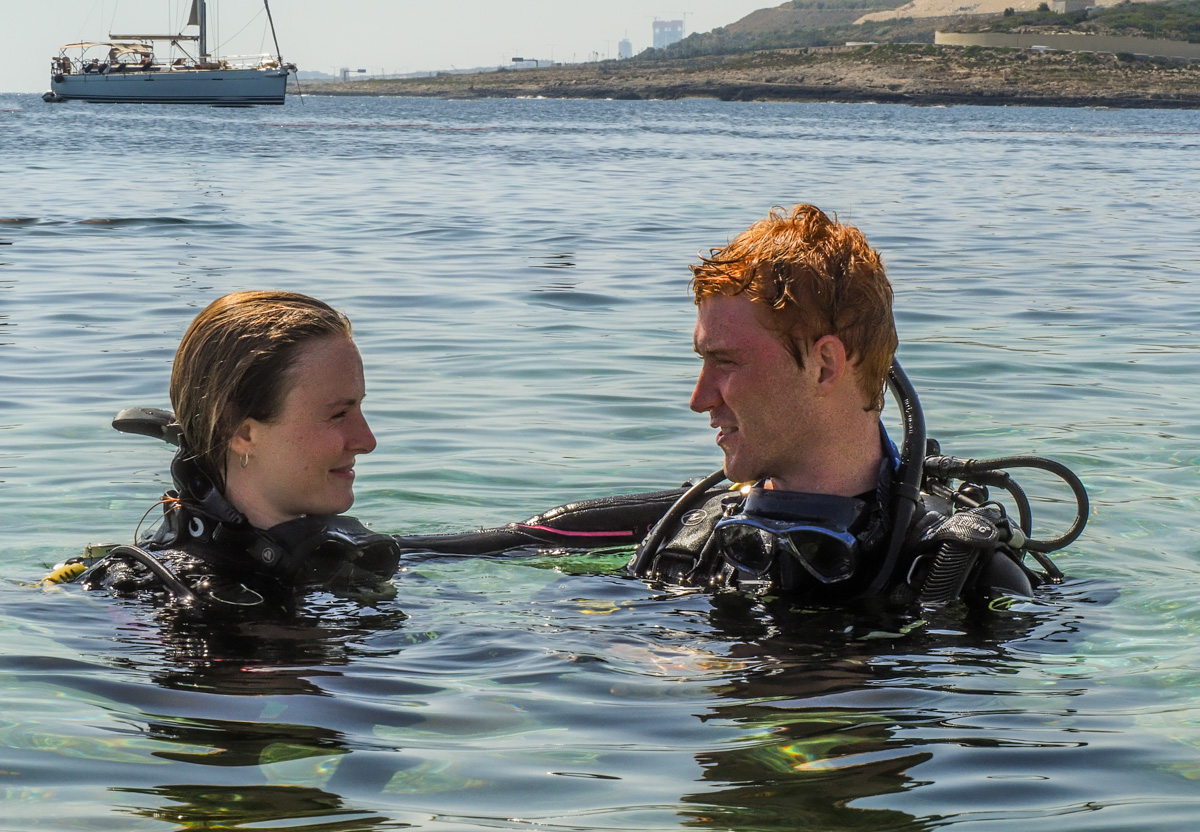
Image by Pete Bullen
With over 40 years’ of experience as a dive centre in the charming village of St Paul’s Bay in Malta, the family-run Maltaqua Dive Centre has a variety of scuba diving courses on offer, backed up by skilled and committed instructors and dive guides.
Maltaqua pride themselves on their ability to match instructor to student in terms of language, age and outlook as closely as possible, offering a complete range of introductory dives, PADI and BSAC courses and daily diving excursions around the three islands of Malta.
Divers staying at the Doubletree by Hilton Malta will be diving with Maltaqua Dive Centre, and additionally the dive centre also manages Sands Apartments—studio apartments purpose-built for divers, and Villa Michael—a newly refurbished villa offering comfortable accommodation in the sought-after seafront location of Qawra.
Aquanauts Dive Centre GrenaDA
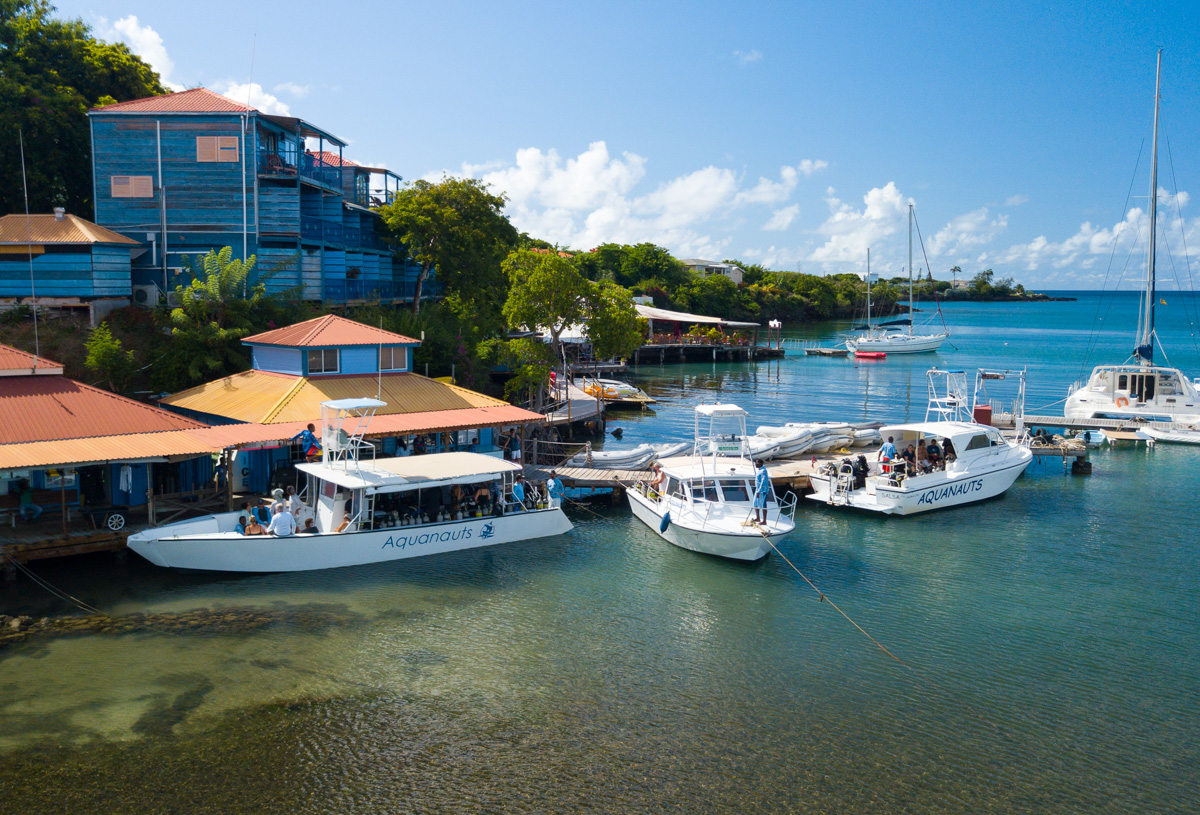
Aquanauts Grenada is a family-owned PADI 5-star dive centre with a great team of dive masters and instructors who have years of experience exploring reefs and wrecks.
The dive centre strives to ensure divers have a great dive every dive and can see the best of Grenada’s underwater world. From wrecks to reefs to sculptures, Grenada has it all and Aquanauts diving courses range from introductory scuba diving to advanced specialities like adaptive and technical diving so whether you’re a beginner or an experienced diver you can connect with the underwater world in a way that resonates with you.
Aquanauts has two bases in Grenada: the beautifully designed and critically acclaimed True Blue Bay Boutique Resort and Spice Island Beach Resort which is considered to be one of the finest hotels in the Caribbean.
“Aquanauts Grenada were a joy to dive with. They were relaxed, professional and friendly even to the extent of being recognised from previous visits.” – Nicholas W.
Nautilus Diving Centre, Sardinia
Image by Apuzzo Vincenzo
Nautilus diving are Sardinia’s only PADI 5-star Gold Palm dive centre, and they’re also an accredited BSAC dive resort. The team at Nautilus pride themselves on catering for divers every need and ensuring they enjoy a truly relaxing diving holiday.
Daily boat diving is offered to the 40 or so dive sites of this region from the dive centre’s two boats: a custom-built dive boat with dive platform, and a smaller Zodiac. For those looking to learn or improve their diving, a full range of courses are available from Open Water courses to PADI Tec diver training.
Accommodation options close to the Nautilus Diving Centre include Hotel Piccada—a traditional Sardinian hotel located just a short walk from Palau port and marina, and La Vecchia Fonte Hotel—a 4-star contemporary hotel also situated close to Palau’s marina.
Orca Dive Club Coral Garden
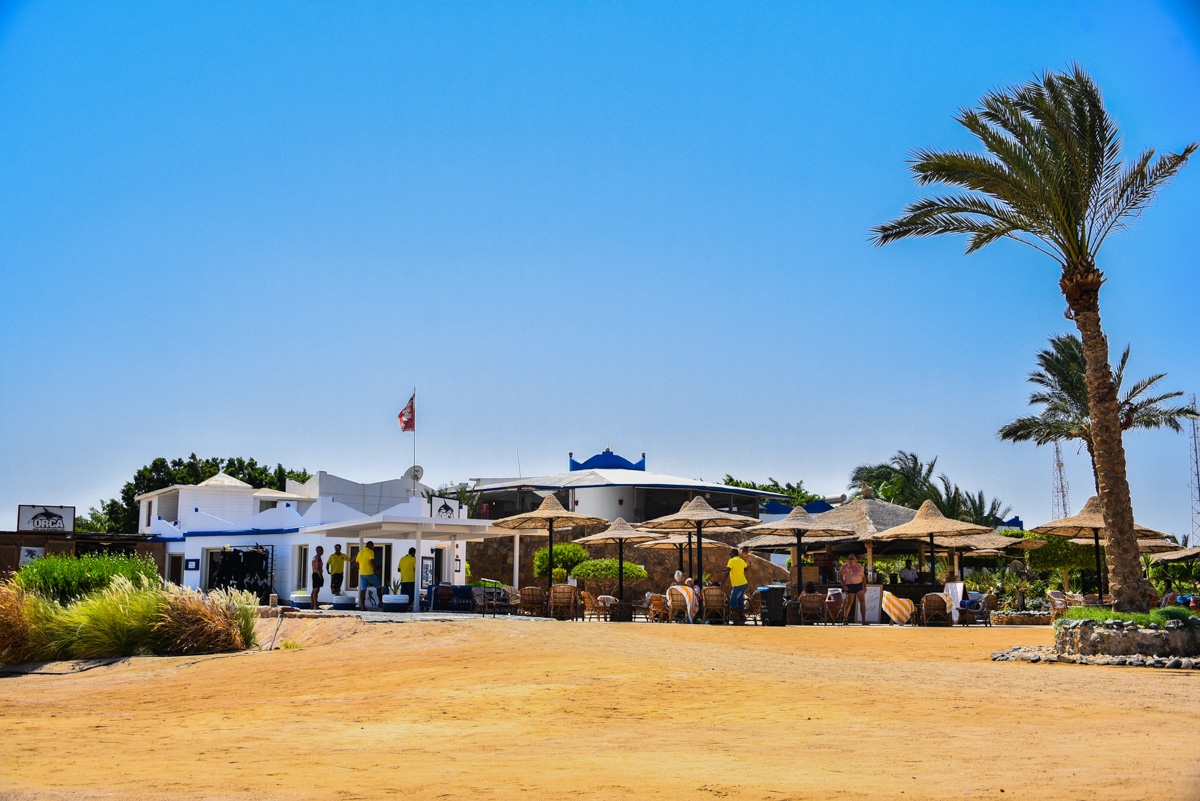
Orca Dive Club, 22 kilometres south of Safaga, is based on-site at Coral Garden Resort, a simple divers’ lodge providing a relaxing stay with superb views over the bay and to the western mountains.
The centre has its own compressor room and two drying rooms with fresh water rinse tanks, and both house reef and shore-based diving are offered. Additionally, the centre offers a range of dive courses and there’s a selection of rental equipment available to hire.
The serene coastal town of Safaga offers some exceptional diving and is still relatively undiscovered. It typically has a reputation for exciting wall diving, however, it’s also an ideal location for novice divers with its several sheltered spots.
“The dive centre was run with precision and expertise. The guides were all very informative and accommodating and the vicinity of everything was so easy.” – Sally P.
To book your 2025 diving holiday, contact our expert dive team, browse our full range of resort and liveaboard holidays, or for more ideas, check out our holiday ideas and inspiration.
Find a trip
- Resort
- Liveaboard
Regaldive Holiday Christmas Gift Vouchers
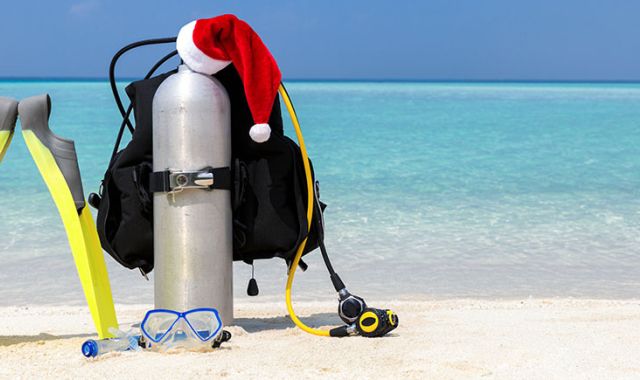
10 Dec 2024
The Ideal Christmas Gift - Regaldive Holiday Christmas Gift Vouchers
You may also want to put a Regaldive Holiday gift voucher on your wish list to Santa, so that you can receive a useful contribution towards your next diving holiday. Just let Santa know how to contact us and we will do the rest!
You can shop for your Regaldive gift vouchers from the comfort of your home or office, with no need to brave the busy High Street shops! Just give us a call on 01353 659999 or send us an email and we would be pleased to arrange your gift vouchers.
Our Christmas gift vouchers are available in a variety of amounts and they are valid for 12 months, so that the lucky recipient can select the dive trip that suits them best.
Find a trip
- Resort
- Liveaboard
Diving as a Group with Mixed Experience

28 Oct 2024
Planning a diving holiday with others can be overwhelming – trying to find something to suit varying levels of dive experience - for apprehensive beginners to confident pro’s, and perhaps even some non-divers thrown into the mix too!
Whether you’re a newly certified diver wanting to build confidence, an intermediate diver wanting to gain experience in different types of diving, or an advanced diver wanting a challenge – there are resorts that can offer it all!
The team of experts at Regaldive has put together a list of resorts which offer great quality diving for all levels of experience. So now, all you need to think about is when you want to travel, what standard of accommodation you desire and what else you want from the resort in terms of entertainment and facilities for when you’re not diving …
Camel Dive Hotel
This small, award-winning divers’ hotel is conveniently located at the centre of Naama Bay in Egypt's popular Sharm El Sheikh. The lively Camel Bar, one of the most popular in town, has a rooftop area overlooking Naama Bay.
The Camel Dive Club offers free transfers to the main Naama Bay jetty with daily boat trips to the 30+ dive sites in the region, including the Straits of Tiran and Ras Mohammed National Park. The sheer number of sites means that there's something for all divers.

Wadi Sabarah
This idyllic retreat at Marsa Alam, Egypt offers a unique blend of tranquillity and adventure. Guests can unwind in the infinity pool, indulge at the Tamarisk restaurant, enjoy a drink at the beach bar or simply enjoy 400 metres of natural beach.
Emperor Divers on-site provides a wide range of diving experiences starting from the extensive house reef. With shore-based dives accessed by road jeep and boat trips to the outer sites, visitors have access to superb diving, including the Elphinstone Reef.
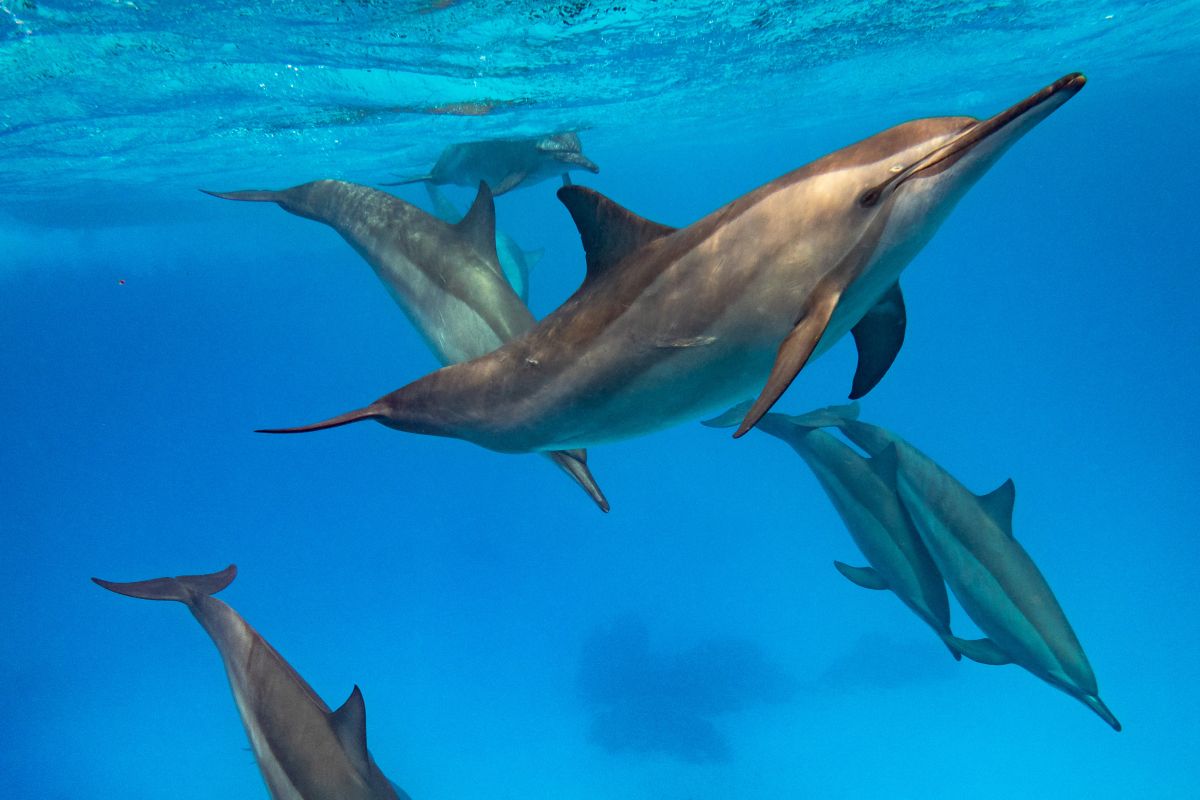
Siladen Resort & Spa
This small resort, accessed by boat from the mainland, occupies a secluded location on a stunning tropical island in the heart of Indonesia's Bunaken National Marine Park. Facilities include a spa, saltwater swimming pool, volleyball, billiards and a library.
The on-site PADI 5-star dive centre offers daily diving and snorkelling for all abilities in the Bunaken National Marine Park. The diving is operated from four traditional Indonesian style vessels, with a maximum of eight to 12 guests per boat.

Magic Island Resort
Nestled in the coastal town of Moalboal, Philippines, this resort beckons scuba diving enthusiasts with its prime location and exceptional diving experiences. The resort has just 10 well-appointed rooms, each with a private verandah.
This PADI 5-star resort caters for beginners to seasoned enthusiasts with at least 25 dive sites, most within five - 25 minutes’ boat ride. Enjoy wall dives or gentle drift dives and witness passing turtles, reef sharks, and even the occasional sardine bait ball.
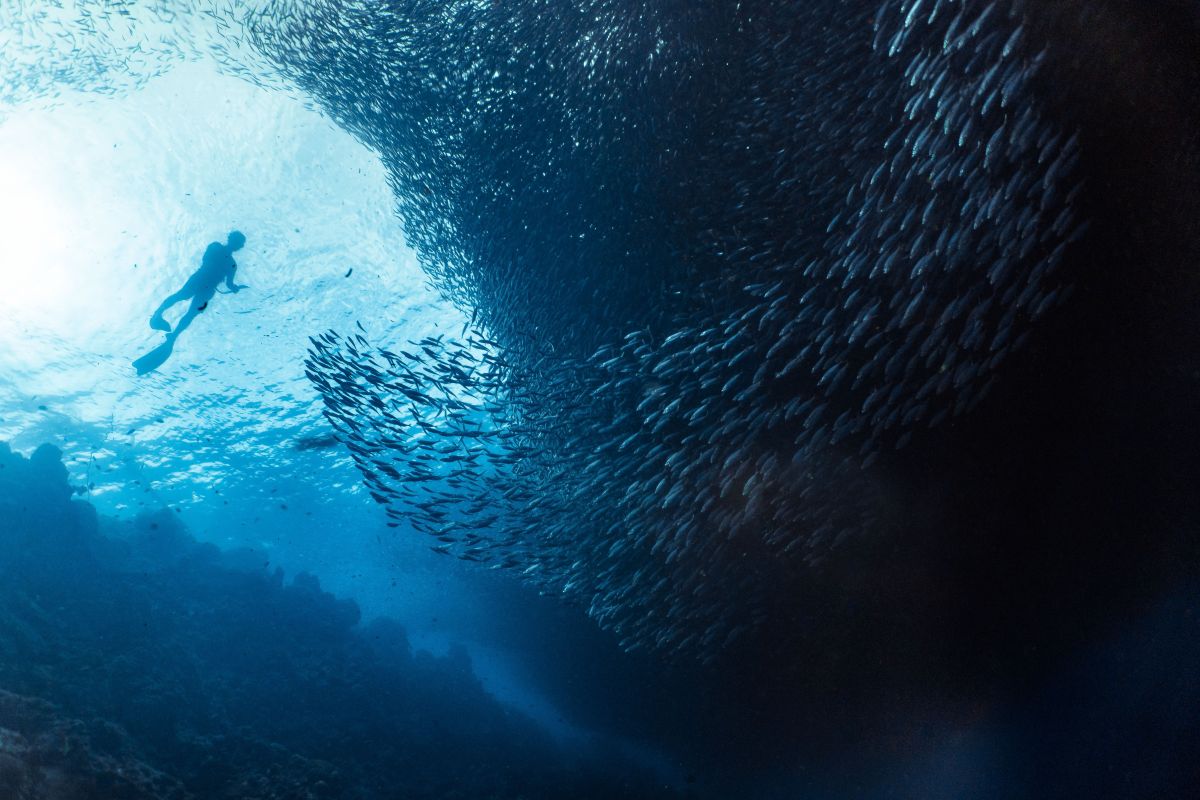
Doubletree by Hilton Malta
Ideal for a short break from the UK, this hotel sits on the water’s edge at Qawra in St. Paul’s Bay and features five swimming pools, many restaurants and bars, a spa and the Oracle Casino. Plus, there's a fitness centre, sauna and excellent facilities for children.
The Maltaqua Dive Centre offers diving to suit all levels and abilities, including guided and unguided diving. Malta is famous for its numerous wrecks and exceptionally clear water.
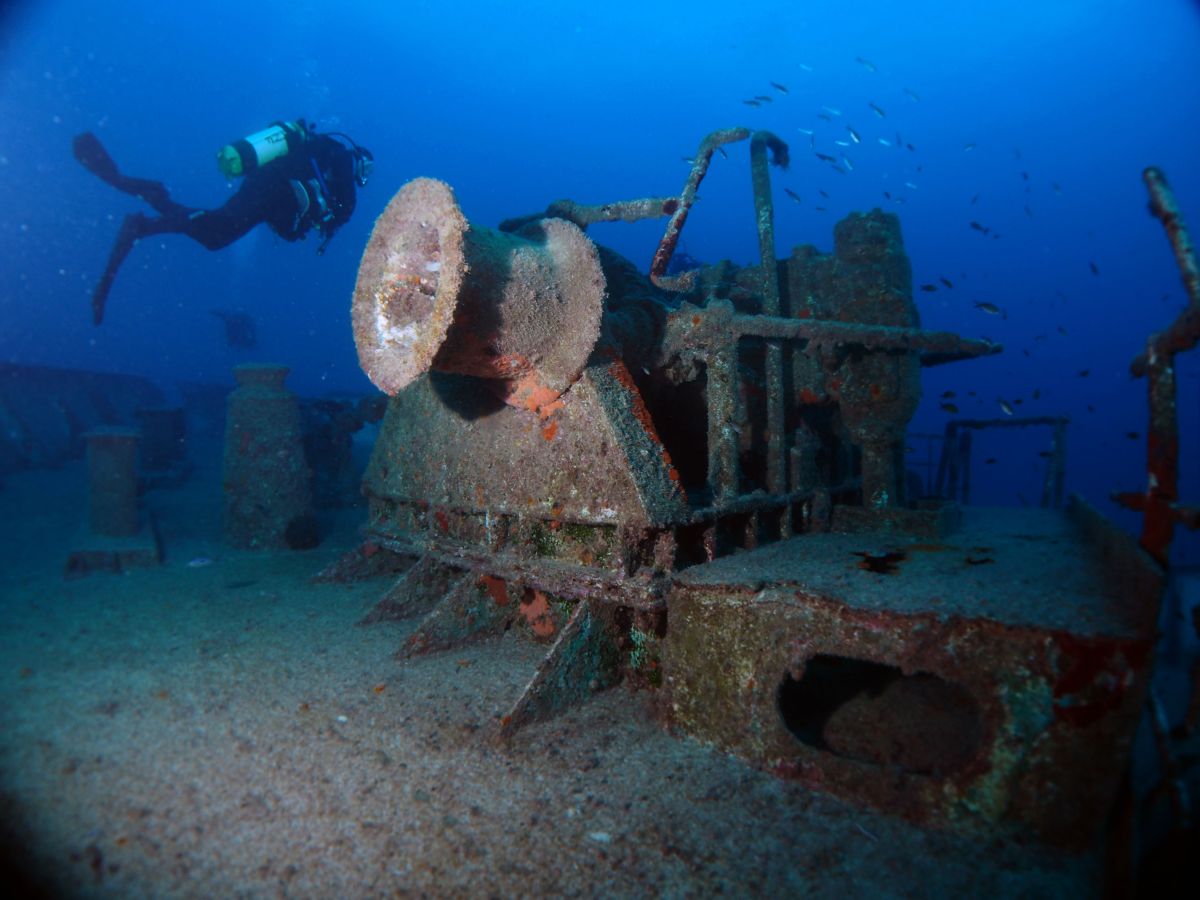
Golden Rock Dive & Nature Resort
Located on the Caribbean island of St Eustatius (also known as Statia), this resort offers a blend of value and luxury. Facilities include a large pool area, a beautiful botanical garden for relaxation and a well-equipped fitness and wellness centre.
Statia Divers, located at the resort, has an experienced team offering diving tailored to your experience. With over 30 dive sites to explore in the marine park, you can expect vibrant marine life including sharks, turtles, and rays.
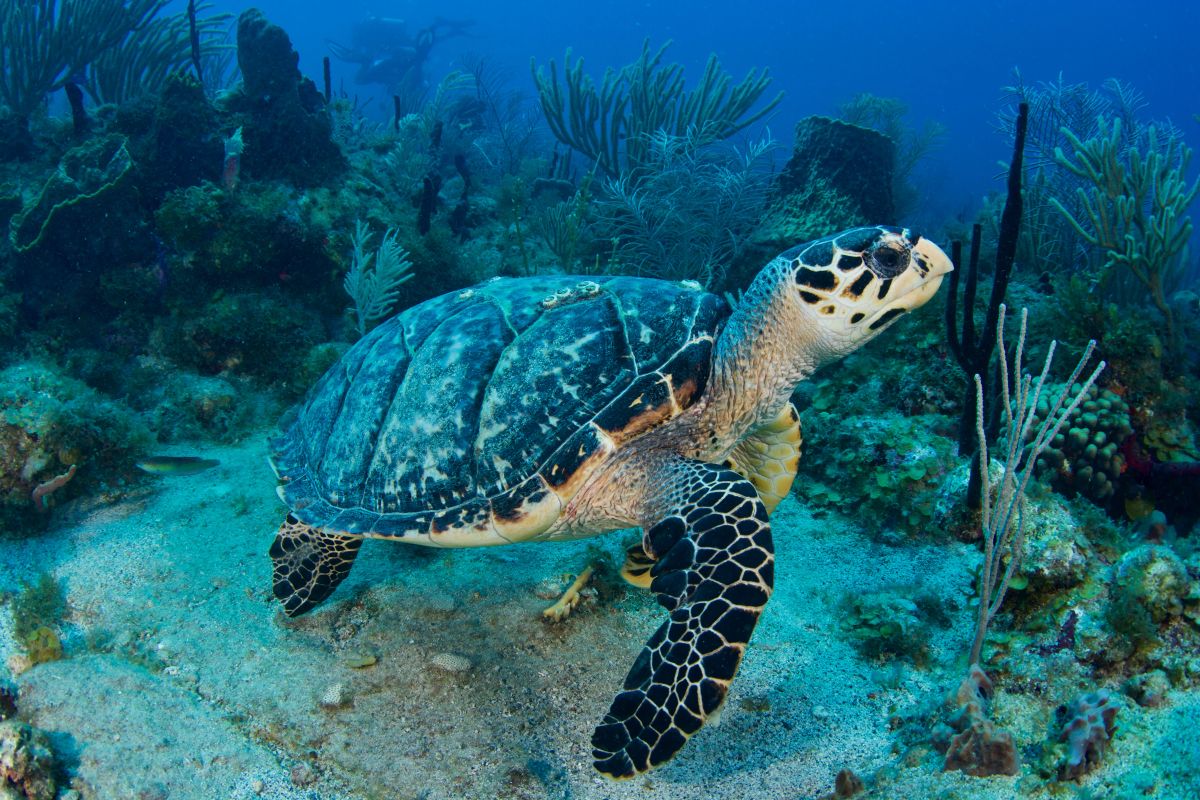
To find out more about any of our diving holidays, contact our expert team today. Alternatively, read more about our dive courses, including options to advance your training further.

